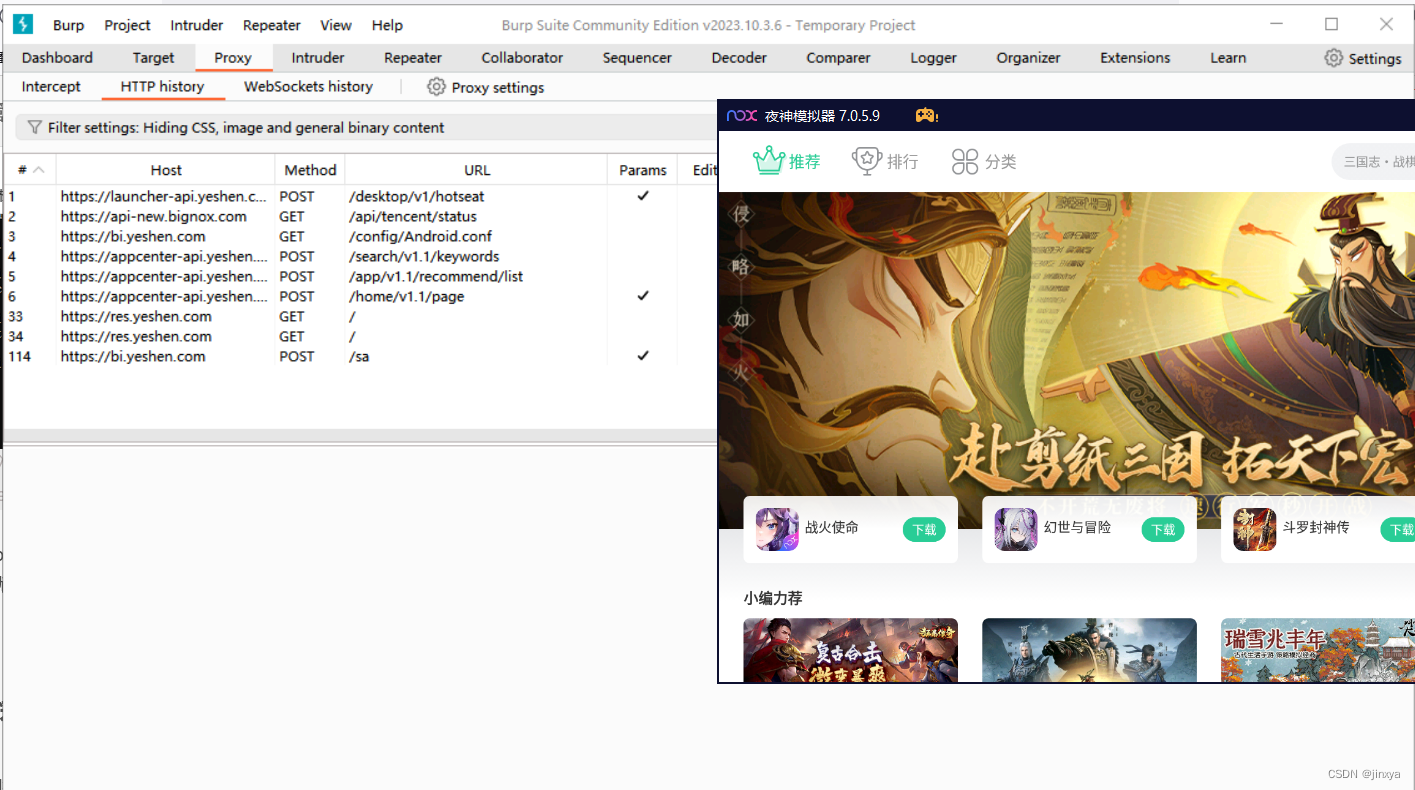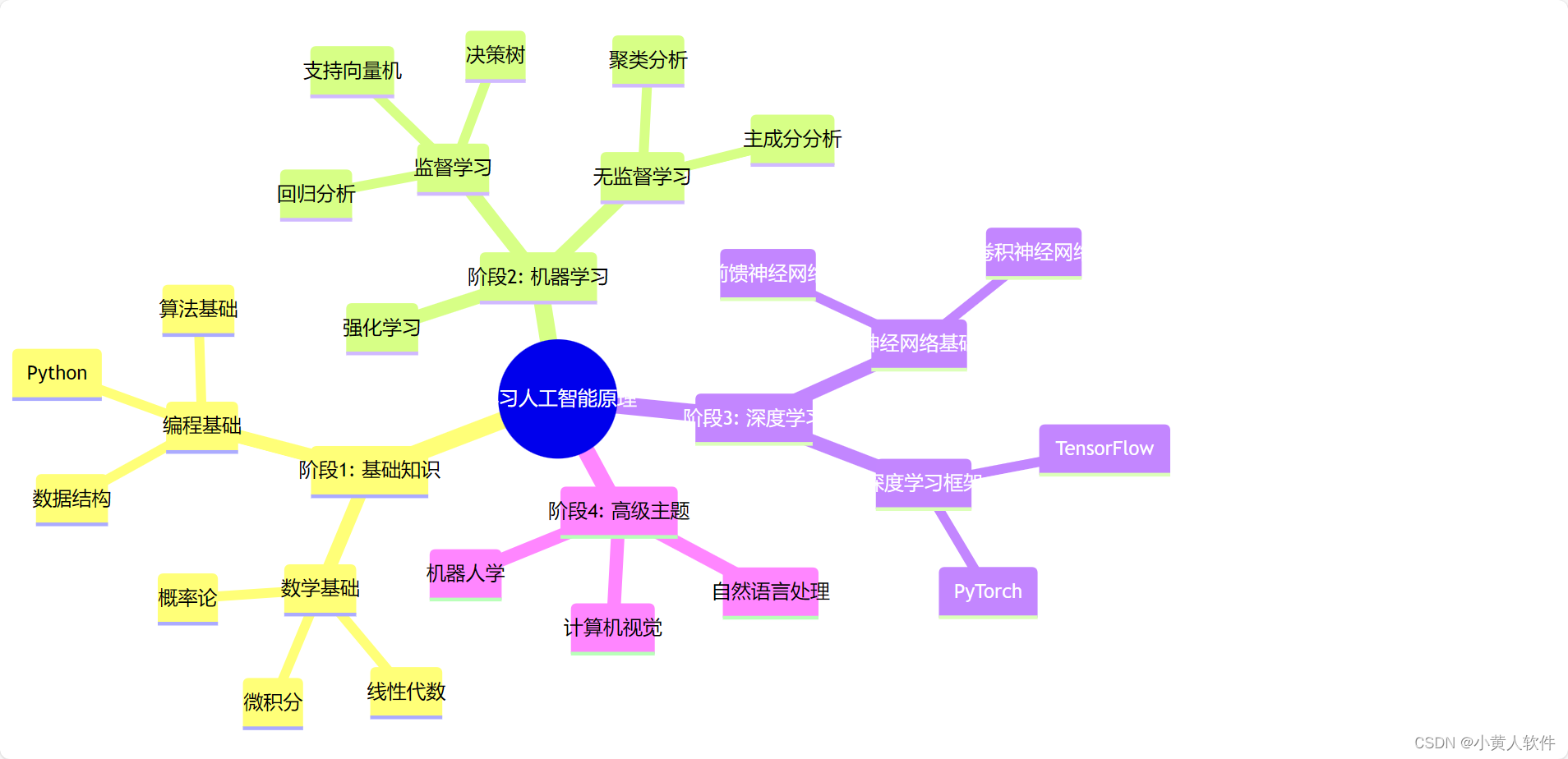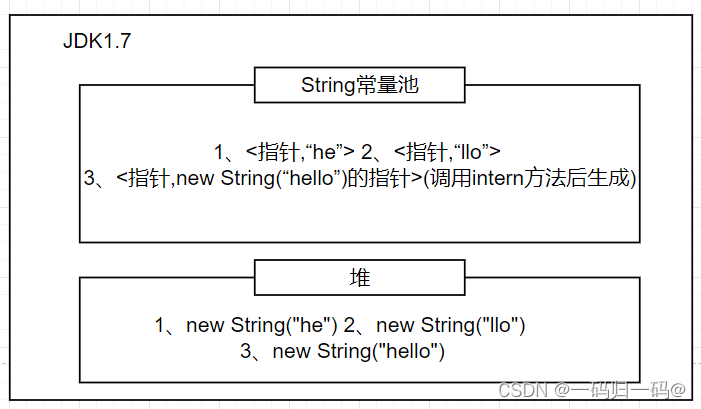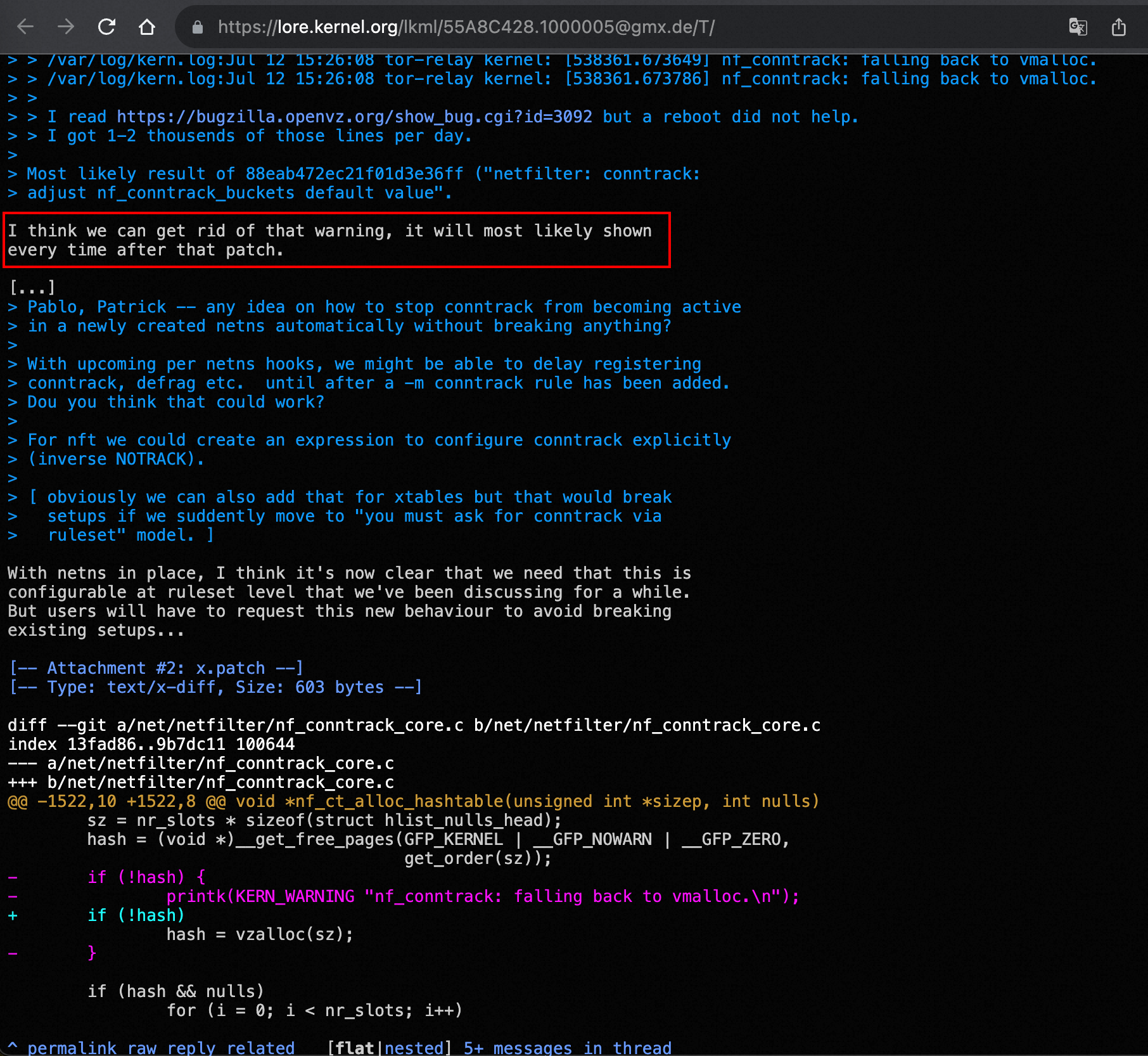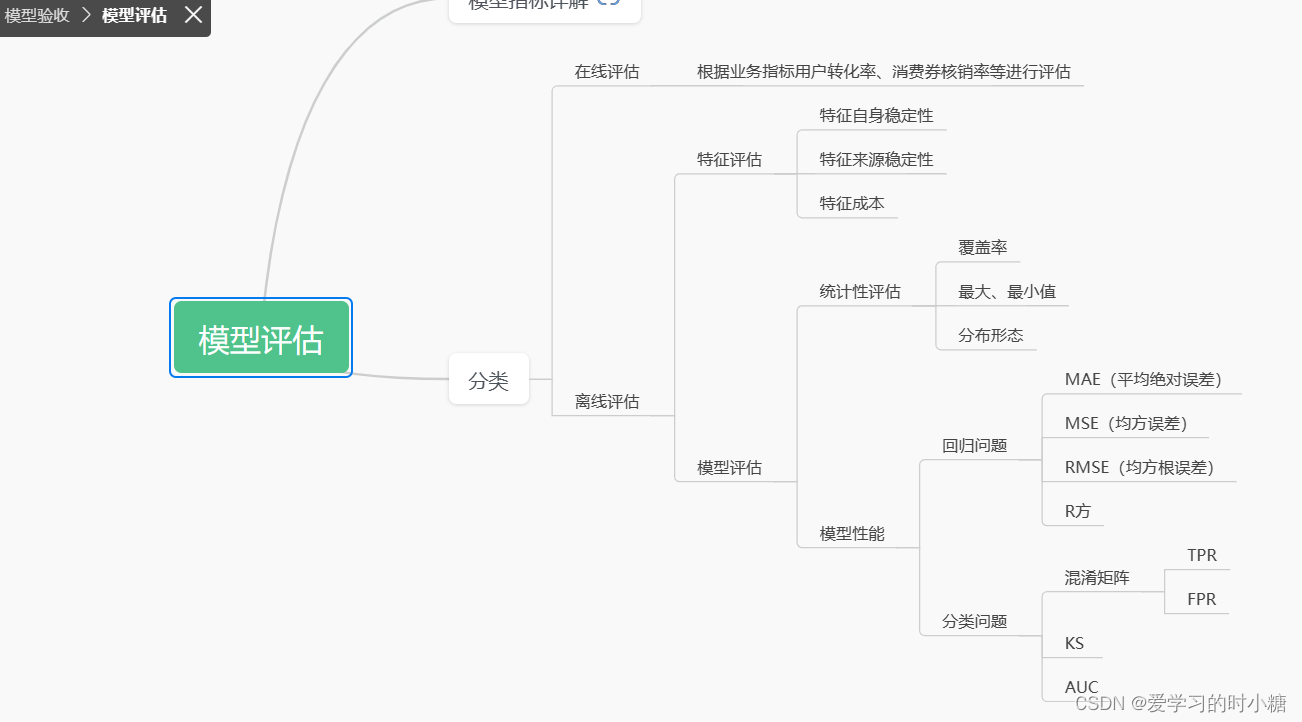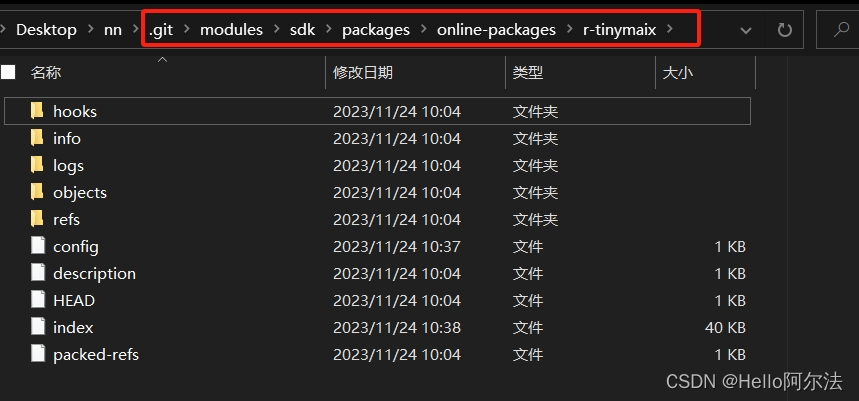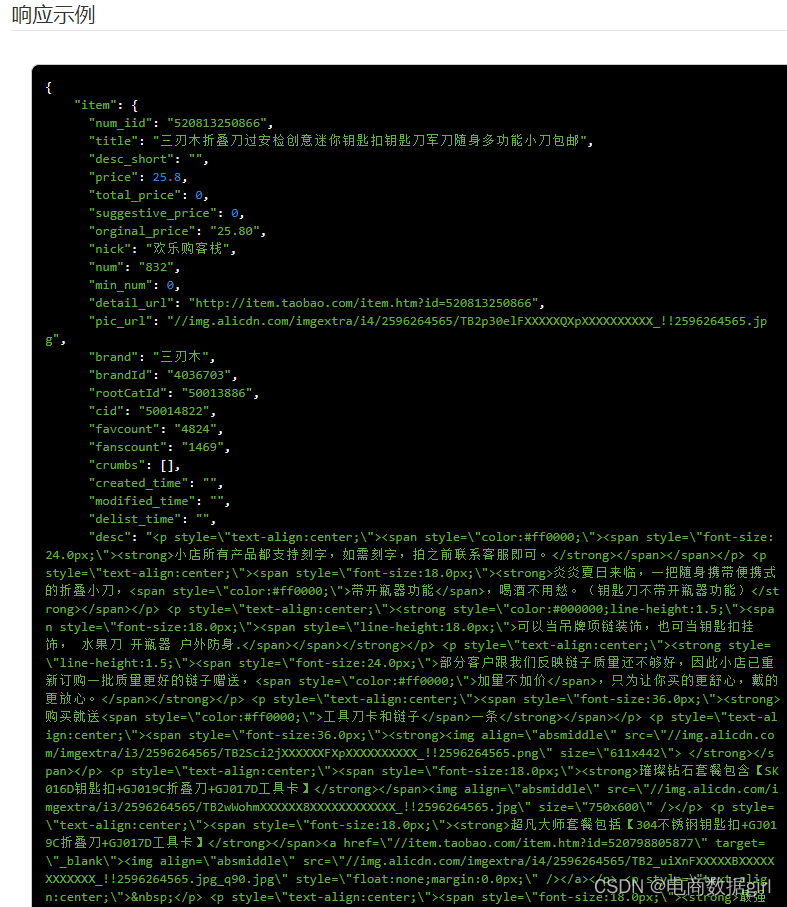研发团队在安装gitlab各版本过程中可能遇到各种问题,为了后续容易查看特将我们在实践过程中遇到的各类问题要点总结如下:
gitlab 10.8.3 (564c342)安装
centos Linux yum安装网址查找网址:gitlab/gitlab-ce - Results for 'gitlab-ce-10.8.3-ce.0.el7.x86_64.rpm' in gitlab/gitlab-ce
根据以上命令行进行yum安装并配置文件
vim /etc/gitlab/gitlab.rb
修改配置文件中的external_url为服务器地址,如下所示:
## GitLab URL
##! URL on which GitLab will be reachable.
##! For more details on configuring external_url see:
##! https://docs.gitlab.com/omnibus/settings/configuration.html#configuring-the-external-url-for-gitlab
#external_url 'http://gitlab.example.com'
external_url 'http://ip:8000' # 这里一定要加上http://并填写具体的服务器IP
nginx['listen_prot'] = 8000;输入重新加载配置命令行:
sudo gitlab-ctl reconfigure报错:
Running handlers:
There was an error running gitlab-ctl reconfigure:
bash[migrate gitlab-rails database] (gitlab::database_migrations line 49) had an error: Mixlib::ShellOut::ShellCommandFailed: Expected process to exit with
---- Begin output of "bash" "/tmp/chef-script20231123-789-uqcsh1" ----
STDOUT: rake aborted!
PG::ConnectionBad: could not connect to server: No such file or directory
Is the server running locally and accepting
connections on Unix domain socket "/var/opt/gitlab/postgresql/.s.PGSQL.5432"?
/opt/gitlab/embedded/service/gitlab-rails/lib/tasks/gitlab/db.rake:49:in `block (3 levels) in <top (required)>'
/opt/gitlab/embedded/bin/bundle:23:in `load'
/opt/gitlab/embedded/bin/bundle:23:in `<main>'
Tasks: TOP => gitlab:db:configure
(See full trace by running task with --trace)
STDERR:
---- End output of "bash" "/tmp/chef-script20231123-789-uqcsh1" ----
Ran "bash" "/tmp/chef-script20231123-789-uqcsh1" returned 1
Running handlers complete
Chef Client failed. 4 resources updated in 44 seconds
发现可能跟postgresql有关,用以下方法:
解决方法:
1、按住CTRL+C强制结束
2、先停止 gitlab ,命令: sudo gitlab-ctl stop
3、执行命令: sudo chmod 755 /var/opt/gitlab/postgresql
4、执行命令:sudo systemctl restart gitlab-runsvdir
5、再次配置:sudo gitlab-ctl reconfigure
6、启动即可:sudo gitlab-ctl restart发现还是出现上面问题,基因团队之前搭建的经验,调整部分配置:
## GitLab URL
##! URL on which GitLab will be reachable.
##! For more details on configuring external_url see:
##! https://docs.gitlab.com/omnibus/settings/configuration.html#configuring-the-external-url-for-gitlab
#external_url 'http://gitlab.example.com'
external_url 'http://ip:8000' # 这里一定要加上http://并填写具体的服务器IP
nginx['listen_prot'] = 8000;
gitlab_rails['rack_attack_git_basic_auth'] = {
'enabled' => true,
'ip_whitelist' => ["127.0.0.1","ip"],
'maxretry' => 300,
'findtime' => 60,
'bantime' => 60
}
postgresql['shared_buffers'] = "128MB"
postgresql['max_connections'] = 200再次执行配置sudo gitlab-ctl reconfigure成功:
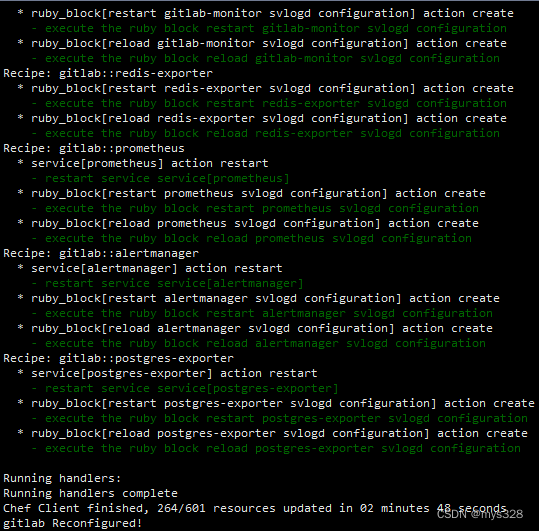
执行启动命令:
[root@i-uf6egykfjqtv6m70211 ~]# sudo gitlab-ctl restart
ok: run: alertmanager: (pid 31714) 1s
ok: run: gitaly: (pid 31739) 0s
ok: run: gitlab-monitor: (pid 31755) 1s
ok: run: gitlab-workhorse: (pid 31777) 0s
ok: run: logrotate: (pid 31805) 1s
ok: run: nginx: (pid 31823) 0s
ok: run: node-exporter: (pid 31847) 0s
ok: run: postgres-exporter: (pid 31939) 1s
ok: run: postgresql: (pid 31948) 0s
ok: run: prometheus: (pid 32072) 0s
ok: run: redis: (pid 32091) 1s
ok: run: redis-exporter: (pid 32111) 0s
ok: run: sidekiq: (pid 32162) 0s
ok: run: unicorn: (pid 32219) 0s
等待约1分钟后,打开gitlab服务主页成功!
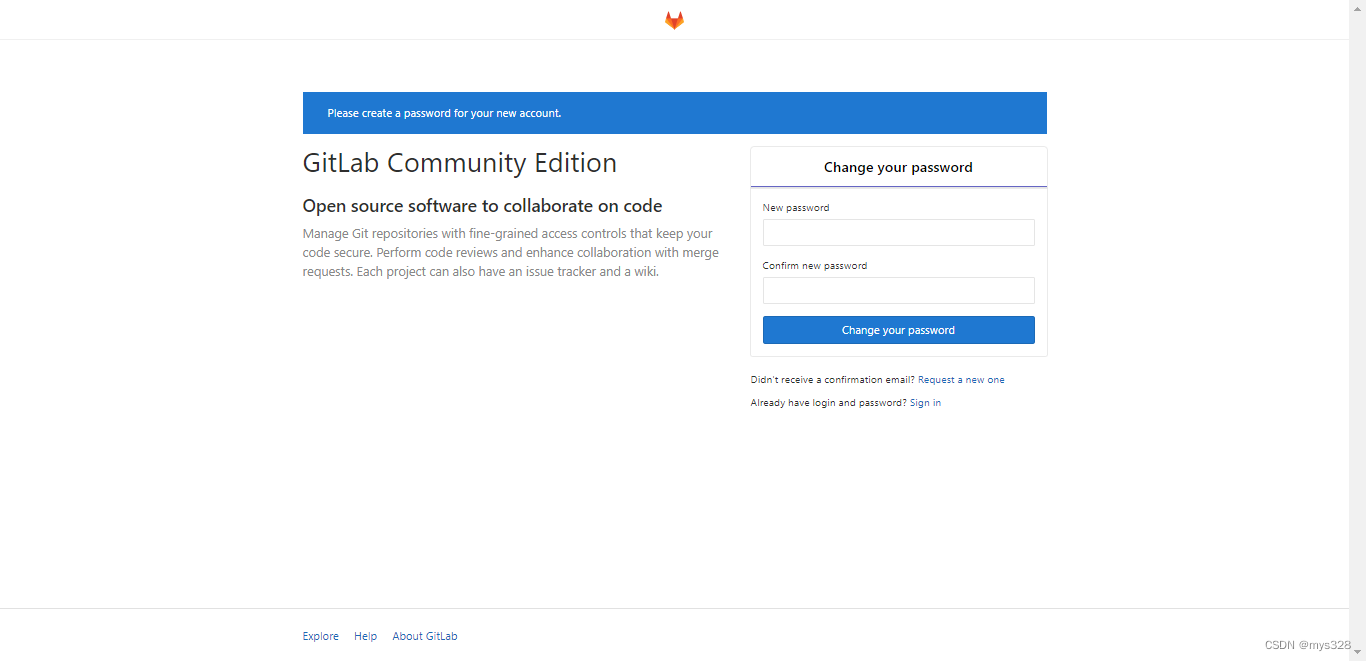 第一次登录后会让更改密码,更改完后即可成功登录:
第一次登录后会让更改密码,更改完后即可成功登录: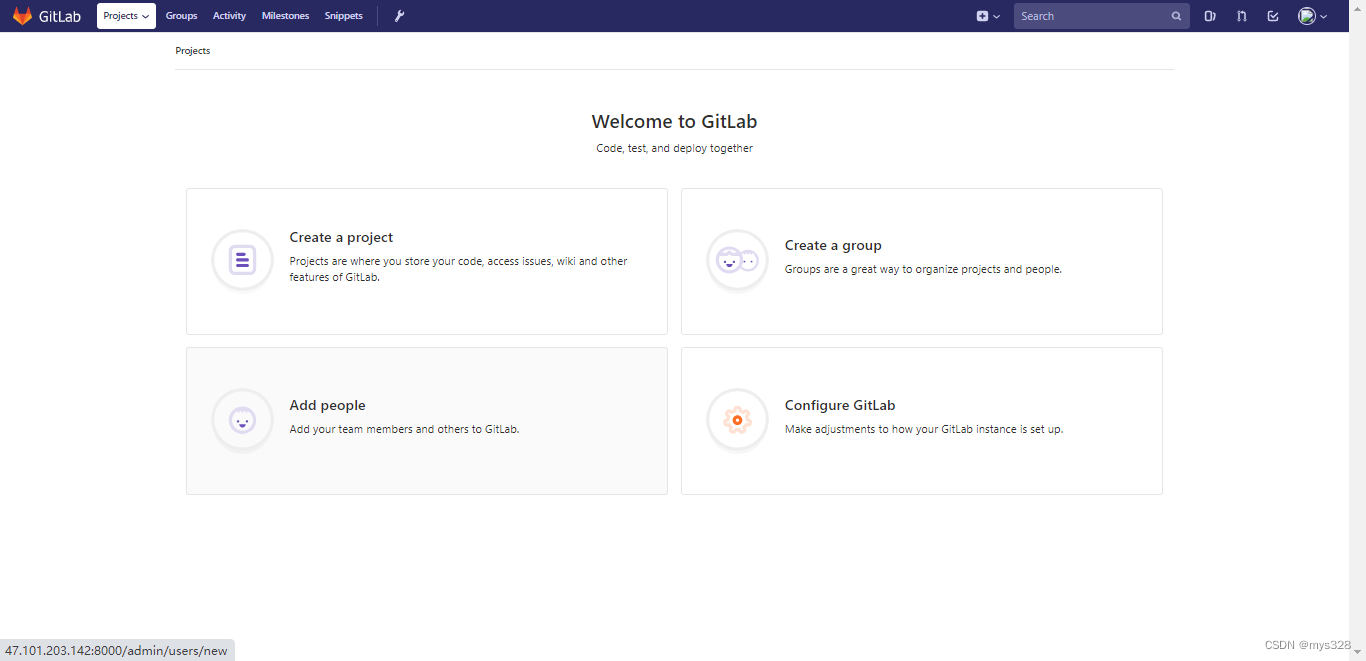
gitlab 10.8.3完整的配置如下所示:
## GitLab configuration settings
##! This file is generated during initial installation and **is not** modified
##! during upgrades.
##! Check out the latest version of this file to know about the different
##! settings that can be configured by this file, which may be found at:
##! https://gitlab.com/gitlab-org/omnibus-gitlab/raw/master/files/gitlab-config-template/gitlab.rb.template
## GitLab URL
##! URL on which GitLab will be reachable.
##! For more details on configuring external_url see:
##! https://docs.gitlab.com/omnibus/settings/configuration.html#configuring-the-external-url-for-gitlab
#external_url 'http://gitlab.example.com'
external_url 'http://ip:8000' # 这里一定要加上http://并填写具体的服务器IP
nginx['listen_prot'] = 8000;
## Roles for multi-instance GitLab
##! The default is to have no roles enabled, which results in GitLab running as an all-in-one instance.
##! Options:
##! redis_sentinel_role redis_master_role redis_slave_role geo_primary_role geo_secondary_role
##! For more deatils on each role, see:
##! https://docs.gitlab.com/omnibus/roles/README.html#roles
##!
# roles ['redis_sentinel_role', 'redis_master_role']
## Legend
##! The following notations at the beginning of each line may be used to
##! differentiate between components of this file and to easily select them using
##! a regex.
##! ## Titles, subtitles etc
##! ##! More information - Description, Docs, Links, Issues etc.
##! Configuration settings have a single # followed by a single space at the
##! beginning; Remove them to enable the setting.
##! **Configuration settings below are optional.**
##! **The values currently assigned are only examples and ARE NOT the default
##! values.**
################################################################################
################################################################################
## Configuration Settings for GitLab CE and EE ##
################################################################################
################################################################################
################################################################################
## gitlab.yml configuration
##! Docs: https://gitlab.com/gitlab-org/omnibus-gitlab/blob/master/doc/settings/gitlab.yml.md
################################################################################
# gitlab_rails['gitlab_ssh_host'] = 'ssh.host_example.com'
# gitlab_rails['time_zone'] = 'UTC'
### Email Settings
# gitlab_rails['gitlab_email_enabled'] = true
# gitlab_rails['gitlab_email_from'] = 'example@example.com'
# gitlab_rails['gitlab_email_display_name'] = 'Example'
# gitlab_rails['gitlab_email_reply_to'] = 'noreply@example.com'
# gitlab_rails['gitlab_email_subject_suffix'] = ''
### GitLab user privileges
# gitlab_rails['gitlab_default_can_create_group'] = true
# gitlab_rails['gitlab_username_changing_enabled'] = true
### Default Theme
# gitlab_rails['gitlab_default_theme'] = 2
### Default project feature settings
# gitlab_rails['gitlab_default_projects_features_issues'] = true
# gitlab_rails['gitlab_default_projects_features_merge_requests'] = true
# gitlab_rails['gitlab_default_projects_features_wiki'] = true
# gitlab_rails['gitlab_default_projects_features_snippets'] = true
# gitlab_rails['gitlab_default_projects_features_builds'] = true
# gitlab_rails['gitlab_default_projects_features_container_registry'] = true
### Automatic issue closing
###! See https://docs.gitlab.com/ce/customization/issue_closing.html for more
###! information about this pattern.
# gitlab_rails['gitlab_issue_closing_pattern'] = "((?:[Cc]los(?:e[sd]?|ing)|[Ff]ix(?:e[sd]|ing)?|[Rr]esolv(?:e[sd]?|ing)|[Ii]mplement(?:s|ed|ing)?)(:?) +(?:(?:issues? +)?%{issue_ref}(?:(?:, *| +and +)?)|([A-Z][A-Z0-9_]+-\d+))+)"
### Download location
###! When a user clicks e.g. 'Download zip' on a project, a temporary zip file
###! is created in the following directory.
# gitlab_rails['gitlab_repository_downloads_path'] = 'tmp/repositories'
### Gravatar Settings
# gitlab_rails['gravatar_plain_url'] = 'http://www.gravatar.com/avatar/%{hash}?s=%{size}&d=identicon'
# gitlab_rails['gravatar_ssl_url'] = 'https://secure.gravatar.com/avatar/%{hash}?s=%{size}&d=identicon'
### Auxiliary jobs
###! Periodically executed jobs, to self-heal Gitlab, do external
###! synchronizations, etc.
###! Docs: https://github.com/ondrejbartas/sidekiq-cron#adding-cron-job
###! https://docs.gitlab.com/ce/ci/yaml/README.html#artifacts:expire_in
# gitlab_rails['stuck_ci_jobs_worker_cron'] = "0 0 * * *"
# gitlab_rails['expire_build_artifacts_worker_cron'] = "50 * * * *"
# gitlab_rails['pipeline_schedule_worker_cron'] = "41 * * * *"
# gitlab_rails['repository_check_worker_cron'] = "20 * * * *"
# gitlab_rails['admin_email_worker_cron'] = "0 0 * * 0"
# gitlab_rails['repository_archive_cache_worker_cron'] = "0 * * * *"
# gitlab_rails['pages_domain_verification_cron_worker'] = "*/15 * * * *"
### Webhook Settings
###! Number of seconds to wait for HTTP response after sending webhook HTTP POST
###! request (default: 10)
# gitlab_rails['webhook_timeout'] = 10
### Trusted proxies
###! Customize if you have GitLab behind a reverse proxy which is running on a
###! different machine.
###! **Add the IP address for your reverse proxy to the list, otherwise users
###! will appear signed in from that address.**
# gitlab_rails['trusted_proxies'] = []
### Monitoring settings
###! IP whitelist controlling access to monitoring endpoints
# gitlab_rails['monitoring_whitelist'] = ['127.0.0.0/8']
###! Time between sampling of unicorn socket metrics, in seconds
# gitlab_rails['monitoring_unicorn_sampler_interval'] = 10
### Reply by email
###! Allow users to comment on issues and merge requests by replying to
###! notification emails.
###! Docs: https://docs.gitlab.com/ce/administration/reply_by_email.html
# gitlab_rails['incoming_email_enabled'] = true
#### Incoming Email Address
####! The email address including the `%{key}` placeholder that will be replaced
####! to reference the item being replied to.
####! **The placeholder can be omitted but if present, it must appear in the
####! "user" part of the address (before the `@`).**
# gitlab_rails['incoming_email_address'] = "gitlab-incoming+%{key}@gmail.com"
#### Email account username
####! **With third party providers, this is usually the full email address.**
####! **With self-hosted email servers, this is usually the user part of the
####! email address.**
# gitlab_rails['incoming_email_email'] = "gitlab-incoming@gmail.com"
#### Email account password
# gitlab_rails['incoming_email_password'] = "[REDACTED]"
#### IMAP Settings
# gitlab_rails['incoming_email_host'] = "imap.gmail.com"
# gitlab_rails['incoming_email_port'] = 993
# gitlab_rails['incoming_email_ssl'] = true
# gitlab_rails['incoming_email_start_tls'] = false
#### Incoming Mailbox Settings
####! The mailbox where incoming mail will end up. Usually "inbox".
# gitlab_rails['incoming_email_mailbox_name'] = "inbox"
####! The IDLE command timeout.
# gitlab_rails['incoming_email_idle_timeout'] = 60
### Job Artifacts
# gitlab_rails['artifacts_enabled'] = true
# gitlab_rails['artifacts_path'] = "/var/opt/gitlab/gitlab-rails/shared/artifacts"
# gitlab_rails['artifacts_object_store_enabled'] = false # EE only
# gitlab_rails['artifacts_object_store_direct_upload'] = false
# gitlab_rails['artifacts_object_store_background_upload'] = true
# gitlab_rails['artifacts_object_store_proxy_download'] = false
# gitlab_rails['artifacts_object_store_remote_directory'] = "artifacts"
# gitlab_rails['artifacts_object_store_connection'] = {
# 'provider' => 'AWS',
# 'region' => 'eu-west-1',
# 'aws_access_key_id' => 'AWS_ACCESS_KEY_ID',
# 'aws_secret_access_key' => 'AWS_SECRET_ACCESS_KEY',
# # # The below options configure an S3 compatible host instead of AWS
# # 'host' => 's3.amazonaws.com',
# # 'endpoint' => nil,
# # 'path_style' => false # Use 'host/bucket_name/object' instead of 'bucket_name.host/object'
# }
### Git LFS
# gitlab_rails['lfs_enabled'] = true
# gitlab_rails['lfs_storage_path'] = "/var/opt/gitlab/gitlab-rails/shared/lfs-objects"
# gitlab_rails['lfs_object_store_enabled'] = false # EE only
# gitlab_rails['lfs_object_store_direct_upload'] = false
# gitlab_rails['lfs_object_store_background_upload'] = true
# gitlab_rails['lfs_object_store_proxy_download'] = false
# gitlab_rails['lfs_object_store_remote_directory'] = "lfs-objects"
# gitlab_rails['lfs_object_store_connection'] = {
# 'provider' => 'AWS',
# 'region' => 'eu-west-1',
# 'aws_access_key_id' => 'AWS_ACCESS_KEY_ID',
# 'aws_secret_access_key' => 'AWS_SECRET_ACCESS_KEY',
# # # The below options configure an S3 compatible host instead of AWS
# # 'host' => 's3.amazonaws.com',
# # 'endpoint' => nil,
# # 'path_style' => false # Use 'host/bucket_name/object' instead of 'bucket_name.host/object'
# }
### GitLab uploads
###! Docs: https://docs.gitlab.com/ee/administration/uploads.html
# gitlab_rails['uploads_storage_path'] = "/var/opt/gitlab/gitlab-rails/public"
# gitlab_rails['uploads_base_dir'] = "uploads/-/system"
# gitlab_rails['uploads_object_store_enabled'] = false # EE only
# gitlab_rails['uploads_object_store_direct_upload'] = false
# gitlab_rails['uploads_object_store_background_upload'] = true
# gitlab_rails['uploads_object_store_proxy_download'] = false
# gitlab_rails['uploads_object_store_remote_directory'] = "uploads"
# gitlab_rails['uploads_object_store_connection'] = {
# 'provider' => 'AWS',
# 'region' => 'eu-west-1',
# 'aws_access_key_id' => 'AWS_ACCESS_KEY_ID',
# 'aws_secret_access_key' => 'AWS_SECRET_ACCESS_KEY',
# # # The below options configure an S3 compatible host instead of AWS
# # 'host' => 's3.amazonaws.com',
# # 'endpoint' => nil,
# # 'path_style' => false # Use 'host/bucket_name/object' instead of 'bucket_name.host/object'
# }
### Usage Statistics
# gitlab_rails['usage_ping_enabled'] = true
### GitLab Mattermost
###! These settings are void if Mattermost is installed on the same omnibus
###! install
# gitlab_rails['mattermost_host'] = "https://mattermost.example.com"
### LDAP Settings
###! Docs: https://docs.gitlab.com/omnibus/settings/ldap.html
###! **Be careful not to break the indentation in the ldap_servers block. It is
###! in yaml format and the spaces must be retained. Using tabs will not work.**
# gitlab_rails['ldap_enabled'] = false
###! **remember to close this block with 'EOS' below**
# gitlab_rails['ldap_servers'] = YAML.load <<-'EOS'
# main: # 'main' is the GitLab 'provider ID' of this LDAP server
# label: 'LDAP'
# host: '_your_ldap_server'
# port: 389
# uid: 'sAMAccountName'
# bind_dn: '_the_full_dn_of_the_user_you_will_bind_with'
# password: '_the_password_of_the_bind_user'
# encryption: 'plain' # "start_tls" or "simple_tls" or "plain"
# verify_certificates: true
# active_directory: true
# allow_username_or_email_login: false
# lowercase_usernames: false
# block_auto_created_users: false
# base: ''
# user_filter: ''
# ## EE only
# group_base: ''
# admin_group: ''
# sync_ssh_keys: false
#
# secondary: # 'secondary' is the GitLab 'provider ID' of second LDAP server
# label: 'LDAP'
# host: '_your_ldap_server'
# port: 389
# uid: 'sAMAccountName'
# bind_dn: '_the_full_dn_of_the_user_you_will_bind_with'
# password: '_the_password_of_the_bind_user'
# encryption: 'plain' # "start_tls" or "simple_tls" or "plain"
# verify_certificates: true
# active_directory: true
# allow_username_or_email_login: false
# lowercase_usernames: false
# block_auto_created_users: false
# base: ''
# user_filter: ''
# ## EE only
# group_base: ''
# admin_group: ''
# sync_ssh_keys: false
# EOS
### OmniAuth Settings
###! Docs: https://docs.gitlab.com/ce/integration/omniauth.html
# gitlab_rails['omniauth_enabled'] = false
# gitlab_rails['omniauth_allow_single_sign_on'] = ['saml']
# gitlab_rails['omniauth_sync_email_from_provider'] = 'saml'
# gitlab_rails['omniauth_sync_profile_from_provider'] = ['saml']
# gitlab_rails['omniauth_sync_profile_attributes'] = ['email']
# gitlab_rails['omniauth_auto_sign_in_with_provider'] = 'saml'
# gitlab_rails['omniauth_block_auto_created_users'] = true
# gitlab_rails['omniauth_auto_link_ldap_user'] = false
# gitlab_rails['omniauth_auto_link_saml_user'] = false
# gitlab_rails['omniauth_external_providers'] = ['twitter', 'google_oauth2']
# gitlab_rails['omniauth_providers'] = [
# {
# "name" => "google_oauth2",
# "app_id" => "YOUR APP ID",
# "app_secret" => "YOUR APP SECRET",
# "args" => { "access_type" => "offline", "approval_prompt" => "" }
# }
# ]
### Backup Settings
###! Docs: https://docs.gitlab.com/omnibus/settings/backups.html
# gitlab_rails['manage_backup_path'] = true
# gitlab_rails['backup_path'] = "/var/opt/gitlab/backups"
###! Docs: https://docs.gitlab.com/ce/raketasks/backup_restore.html#backup-archive-permissions
# gitlab_rails['backup_archive_permissions'] = 0644
# gitlab_rails['backup_pg_schema'] = 'public'
###! The duration in seconds to keep backups before they are allowed to be deleted
# gitlab_rails['backup_keep_time'] = 604800
# gitlab_rails['backup_upload_connection'] = {
# 'provider' => 'AWS',
# 'region' => 'eu-west-1',
# 'aws_access_key_id' => 'AKIAKIAKI',
# 'aws_secret_access_key' => 'secret123'
# }
# gitlab_rails['backup_upload_remote_directory'] = 'my.s3.bucket'
# gitlab_rails['backup_multipart_chunk_size'] = 104857600
###! **Turns on AWS Server-Side Encryption with Amazon S3-Managed Keys for
###! backups**
# gitlab_rails['backup_encryption'] = 'AES256'
###! **Specifies Amazon S3 storage class to use for backups. Valid values
###! include 'STANDARD', 'STANDARD_IA', 'GLACIER', and
###! 'REDUCED_REDUNDANCY'**
# gitlab_rails['backup_storage_class'] = 'STANDARD'
### For setting up different data storing directory
###! Docs: https://docs.gitlab.com/omnibus/settings/configuration.html#storing-git-data-in-an-alternative-directory
###! **If you want to use a single non-default directory to store git data use a
###! path that doesn't contain symlinks.**
# git_data_dirs({
# "default" => {
# "path" => "/mnt/nfs-01/git-data"
# }
# })
### Gitaly settings
# gitlab_rails['gitaly_token'] = 'secret token'
### For storing GitLab application uploads, eg. LFS objects, build artifacts
###! Docs: https://docs.gitlab.com/ce/development/shared_files.html
# gitlab_rails['shared_path'] = '/var/opt/gitlab/gitlab-rails/shared'
### Wait for file system to be mounted
###! Docs: https://docs.gitlab.com/omnibus/settings/configuration.html#only-start-omnibus-gitlab-services-after-a-given-filesystem-is-mounted
# high_availability['mountpoint'] = ["/var/opt/gitlab/git-data", "/var/opt/gitlab/gitlab-rails/shared"]
### GitLab Shell settings for GitLab
# gitlab_rails['gitlab_shell_ssh_port'] = 22
# gitlab_rails['gitlab_shell_git_timeout'] = 800
### Extra customization
# gitlab_rails['extra_google_analytics_id'] = '_your_tracking_id'
# gitlab_rails['extra_piwik_url'] = '_your_piwik_url'
# gitlab_rails['extra_piwik_site_id'] = '_your_piwik_site_id'
##! Docs: https://docs.gitlab.com/omnibus/settings/environment-variables.html
# gitlab_rails['env'] = {
# 'BUNDLE_GEMFILE' => "/opt/gitlab/embedded/service/gitlab-rails/Gemfile",
# 'PATH' => "/opt/gitlab/bin:/opt/gitlab/embedded/bin:/bin:/usr/bin"
# }
# gitlab_rails['rack_attack_git_basic_auth'] = {
# 'enabled' => true,
# 'ip_whitelist' => ["127.0.0.1"],
# 'maxretry' => 10,
# 'findtime' => 60,
# 'bantime' => 3600
# }
gitlab_rails['rack_attack_git_basic_auth'] = {
'enabled' => true,
'ip_whitelist' => ["127.0.0.1","ip"],
'maxretry' => 300,
'findtime' => 60,
'bantime' => 60
}
# gitlab_rails['rack_attack_protected_paths'] = [
# '/users/password',
# '/users/sign_in',
# '/api/#{API::API.version}/session.json',
# '/api/#{API::API.version}/session',
# '/users',
# '/users/confirmation',
# '/unsubscribes/',
# '/import/github/personal_access_token'
# ]
###! **We do not recommend changing these directories.**
# gitlab_rails['dir'] = "/var/opt/gitlab/gitlab-rails"
# gitlab_rails['log_directory'] = "/var/log/gitlab/gitlab-rails"
### GitLab application settings
# gitlab_rails['uploads_directory'] = "/var/opt/gitlab/gitlab-rails/uploads"
# gitlab_rails['rate_limit_requests_per_period'] = 10
# gitlab_rails['rate_limit_period'] = 60
#### Change the initial default admin password and shared runner registraion tokens.
####! **Only applicable on initial setup, changing these settings after database
####! is created and seeded won't yield any change.**
# gitlab_rails['initial_root_password'] = "password"
# gitlab_rails['initial_shared_runners_registration_token'] = "token"
#### Enable or disable automatic database migrations
# gitlab_rails['auto_migrate'] = true
#### This is advanced feature used by large gitlab deployments where loading
#### whole RAILS env takes a lot of time.
# gitlab_rails['rake_cache_clear'] = true
### GitLab database settings
###! Docs: https://docs.gitlab.com/omnibus/settings/database.html
###! **Only needed if you use an external database.**
# gitlab_rails['db_adapter'] = "postgresql"
# gitlab_rails['db_encoding'] = "unicode"
# gitlab_rails['db_collation'] = nil
# gitlab_rails['db_database'] = "gitlabhq_production"
# gitlab_rails['db_pool'] = 10
# gitlab_rails['db_username'] = "gitlab"
# gitlab_rails['db_password'] = nil
# gitlab_rails['db_host'] = nil
# gitlab_rails['db_port'] = 5432
# gitlab_rails['db_socket'] = nil
# gitlab_rails['db_sslmode'] = nil
# gitlab_rails['db_sslrootcert'] = nil
# gitlab_rails['db_prepared_statements'] = false
# gitlab_rails['db_statements_limit'] = 1000
### GitLab Redis settings
###! Connect to your own Redis instance
###! Docs: https://docs.gitlab.com/omnibus/settings/redis.html
#### Redis TCP connection
# gitlab_rails['redis_host'] = "127.0.0.1"
# gitlab_rails['redis_port'] = 6379
# gitlab_rails['redis_password'] = nil
# gitlab_rails['redis_database'] = 0
#### Redis local UNIX socket (will be disabled if TCP method is used)
# gitlab_rails['redis_socket'] = "/var/opt/gitlab/redis/redis.socket"
#### Sentinel support
####! To have Sentinel working, you must enable Redis TCP connection support
####! above and define a few Sentinel hosts below (to get a reliable setup
####! at least 3 hosts).
####! **You don't need to list every sentinel host, but the ones not listed will
####! not be used in a fail-over situation to query for the new master.**
# gitlab_rails['redis_sentinels'] = [
# {'host' => '127.0.0.1', 'port' => 26379},
# ]
#### Separate instances support
###! Docs: https://docs.gitlab.com/omnibus/settings/redis.html#running-with-multiple-redis-instances
# gitlab_rails['redis_cache_instance'] = nil
# gitlab_rails['redis_cache_sentinels'] = nil
# gitlab_rails['redis_queues_instance'] = nil
# gitlab_rails['redis_queues_sentinels'] = nil
# gitlab_rails['redis_shared_state_instance'] = nil
# gitlab_rails['redis_shared_sentinels'] = nil
### GitLab email server settings
###! Docs: https://docs.gitlab.com/omnibus/settings/smtp.html
###! **Use smtp instead of sendmail/postfix.**
# gitlab_rails['smtp_enable'] = true
# gitlab_rails['smtp_address'] = "smtp.server"
# gitlab_rails['smtp_port'] = 465
# gitlab_rails['smtp_user_name'] = "smtp user"
# gitlab_rails['smtp_password'] = "smtp password"
# gitlab_rails['smtp_domain'] = "example.com"
# gitlab_rails['smtp_authentication'] = "login"
# gitlab_rails['smtp_enable_starttls_auto'] = true
# gitlab_rails['smtp_tls'] = false
###! **Can be: 'none', 'peer', 'client_once', 'fail_if_no_peer_cert'**
###! Docs: http://api.rubyonrails.org/classes/ActionMailer/Base.html
# gitlab_rails['smtp_openssl_verify_mode'] = 'none'
# gitlab_rails['smtp_ca_path'] = "/etc/ssl/certs"
# gitlab_rails['smtp_ca_file'] = "/etc/ssl/certs/ca-certificates.crt"
################################################################################
## Container Registry settings
##! Docs: https://docs.gitlab.com/ce/administration/container_registry.html
################################################################################
# registry_external_url 'https://registry.gitlab.example.com'
### Settings used by GitLab application
# gitlab_rails['registry_enabled'] = true
# gitlab_rails['registry_host'] = "registry.gitlab.example.com"
# gitlab_rails['registry_port'] = "5005"
# gitlab_rails['registry_path'] = "/var/opt/gitlab/gitlab-rails/shared/registry"
###! **Do not change the following 3 settings unless you know what you are
###! doing**
# gitlab_rails['registry_api_url'] = "http://localhost:5000"
# gitlab_rails['registry_key_path'] = "/var/opt/gitlab/gitlab-rails/certificate.key"
# gitlab_rails['registry_issuer'] = "omnibus-gitlab-issuer"
### Settings used by Registry application
# registry['enable'] = true
# registry['username'] = "registry"
# registry['group'] = "registry"
# registry['uid'] = nil
# registry['gid'] = nil
# registry['dir'] = "/var/opt/gitlab/registry"
# registry['registry_http_addr'] = "localhost:5000"
# registry['debug_addr'] = "localhost:5001"
# registry['log_directory'] = "/var/log/gitlab/registry"
# registry['env_directory'] = "/opt/gitlab/etc/registry/env"
# registry['env'] = {}
# registry['log_level'] = "info"
# registry['rootcertbundle'] = "/var/opt/gitlab/registry/certificate.crt"
# registry['health_storagedriver_enabled'] = true
# registry['storage_delete_enabled'] = true
### Registry backend storage
###! Docs: https://docs.gitlab.com/ce/administration/container_registry.html#container-registry-storage-driver
# registry['storage'] = {
# 's3' => {
# 'accesskey' => 'AKIAKIAKI',
# 'secretkey' => 'secret123',
# 'bucket' => 'gitlab-registry-bucket-AKIAKIAKI'
# }
# }
### Registry notifications endpoints
# registry['notifications'] = [
# {
# 'name' => 'test_endpoint',
# 'url' => 'https://gitlab.example.com/notify2',
# 'timeout' => '500ms',
# 'threshold' => 5,
# 'backoff' => '1s',
# 'headers' => {
# "Authorization" => ["AUTHORIZATION_EXAMPLE_TOKEN"]
# }
# }
# ]
### Default registry notifications
# registry['default_notifications_timeout'] = "500ms"
# registry['default_notifications_threshold'] = 5
# registry['default_notifications_backoff'] = "1s"
# registry['default_notifications_headers'] = {}
################################################################################
## GitLab Workhorse
##! Docs: https://gitlab.com/gitlab-org/gitlab-workhorse/blob/master/README.md
################################################################################
# gitlab_workhorse['enable'] = true
# gitlab_workhorse['ha'] = false
# gitlab_workhorse['listen_network'] = "unix"
# gitlab_workhorse['listen_umask'] = 000
# gitlab_workhorse['listen_addr'] = "/var/opt/gitlab/gitlab-workhorse/socket"
# gitlab_workhorse['auth_backend'] = "http://localhost:8080"
##! the empty string is the default in gitlab-workhorse option parser
# gitlab_workhorse['auth_socket'] = "''"
##! put an empty string on the command line
# gitlab_workhorse['pprof_listen_addr'] = "''"
# gitlab_workhorse['prometheus_listen_addr'] = "localhost:9229"
# gitlab_workhorse['dir'] = "/var/opt/gitlab/gitlab-workhorse"
# gitlab_workhorse['log_directory'] = "/var/log/gitlab/gitlab-workhorse"
# gitlab_workhorse['proxy_headers_timeout'] = "1m0s"
##! limit number of concurrent API requests, defaults to 0 which is unlimited
# gitlab_workhorse['api_limit'] = 0
##! limit number of API requests allowed to be queued, defaults to 0 which
##! disables queuing
# gitlab_workhorse['api_queue_limit'] = 0
##! duration after which we timeout requests if they sit too long in the queue
# gitlab_workhorse['api_queue_duration'] = "30s"
##! Long polling duration for job requesting for runners
# gitlab_workhorse['api_ci_long_polling_duration'] = "60s"
##! Log format: default is text, can also be json or none.
# gitlab_workhorse['log_format'] = "json"
# gitlab_workhorse['env'] = {
# 'PATH' => "/opt/gitlab/bin:/opt/gitlab/embedded/bin:/bin:/usr/bin"
# }
################################################################################
## GitLab User Settings
##! Modify default git user.
##! Docs: https://docs.gitlab.com/omnibus/settings/configuration.html#changing-the-name-of-the-git-user-group
################################################################################
# user['username'] = "git"
# user['group'] = "git"
# user['uid'] = nil
# user['gid'] = nil
##! The shell for the git user
# user['shell'] = "/bin/sh"
##! The home directory for the git user
# user['home'] = "/var/opt/gitlab"
# user['git_user_name'] = "GitLab"
# user['git_user_email'] = "gitlab@#{node['fqdn']}"
################################################################################
## GitLab Unicorn
##! Tweak unicorn settings.
##! Docs: https://docs.gitlab.com/omnibus/settings/unicorn.html
################################################################################
# unicorn['worker_timeout'] = 60
###! Minimum worker_processes is 2 at this moment
###! See https://gitlab.com/gitlab-org/gitlab-ce/issues/18771
# unicorn['worker_processes'] = 2
### Advanced settings
# unicorn['listen'] = '127.0.0.1'
# unicorn['port'] = 8080
# unicorn['socket'] = '/var/opt/gitlab/gitlab-rails/sockets/gitlab.socket'
# unicorn['pidfile'] = '/opt/gitlab/var/unicorn/unicorn.pid'
# unicorn['tcp_nopush'] = true
# unicorn['backlog_socket'] = 1024
###! **Make sure somaxconn is equal or higher then backlog_socket**
# unicorn['somaxconn'] = 1024
###! **We do not recommend changing this setting**
# unicorn['log_directory'] = "/var/log/gitlab/unicorn"
### **Only change these settings if you understand well what they mean**
###! Docs: https://about.gitlab.com/2015/06/05/how-gitlab-uses-unicorn-and-unicorn-worker-killer/
###! https://github.com/kzk/unicorn-worker-killer
# unicorn['worker_memory_limit_min'] = "400 * 1 << 20"
# unicorn['worker_memory_limit_max'] = "650 * 1 << 20"
################################################################################
## GitLab Sidekiq
################################################################################
# sidekiq['log_directory'] = "/var/log/gitlab/sidekiq"
# sidekiq['log_format'] = "default"
# sidekiq['shutdown_timeout'] = 4
# sidekiq['concurrency'] = 25
# sidekiq['metrics_enabled'] = true
# sidekiq['listen_address'] = 127.0.0.1
# sidekiq['listen_port'] = 8082
################################################################################
## gitlab-shell
################################################################################
# gitlab_shell['audit_usernames'] = false
# gitlab_shell['log_level'] = 'INFO'
# gitlab_shell['log_format'] = 'json'
# gitlab_shell['http_settings'] = { user: 'username', password: 'password', ca_file: '/etc/ssl/cert.pem', ca_path: '/etc/pki/tls/certs', self_signed_cert: false}
# gitlab_shell['log_directory'] = "/var/log/gitlab/gitlab-shell/"
# gitlab_shell['custom_hooks_dir'] = "/opt/gitlab/embedded/service/gitlab-shell/hooks"
# gitlab_shell['auth_file'] = "/var/opt/gitlab/.ssh/authorized_keys"
### Git trace log file.
###! If set, git commands receive GIT_TRACE* environment variables
###! Docs: https://git-scm.com/book/es/v2/Git-Internals-Environment-Variables#Debugging
###! An absolute path starting with / – the trace output will be appended to
###! that file. It needs to exist so we can check permissions and avoid
###! throwing warnings to the users.
# gitlab_shell['git_trace_log_file'] = "/var/log/gitlab/gitlab-shell/gitlab-shell-git-trace.log"
##! **We do not recommend changing this directory.**
# gitlab_shell['dir'] = "/var/opt/gitlab/gitlab-shell"
################################################################
## GitLab PostgreSQL
################################################################
###! Changing any of these settings requires a restart of postgresql.
###! By default, reconfigure reloads postgresql if it is running. If you
###! change any of these settings, be sure to run `gitlab-ctl restart postgresql`
###! after reconfigure in order for the changes to take effect.
# postgresql['enable'] = true
# postgresql['listen_address'] = nil
# postgresql['port'] = 5432
# postgresql['data_dir'] = "/var/opt/gitlab/postgresql/data"
##! **recommend value is 1/4 of total RAM, up to 14GB.**
# postgresql['shared_buffers'] = "256MB"
postgresql['shared_buffers'] = "128MB"
### Advanced settings
# postgresql['ha'] = false
# postgresql['dir'] = "/var/opt/gitlab/postgresql"
# postgresql['log_directory'] = "/var/log/gitlab/postgresql"
# postgresql['username'] = "gitlab-psql"
# postgresql['uid'] = nil
# postgresql['gid'] = nil
# postgresql['shell'] = "/bin/sh"
# postgresql['home'] = "/var/opt/gitlab/postgresql"
# postgresql['user_path'] = "/opt/gitlab/embedded/bin:/opt/gitlab/bin:$PATH"
# postgresql['sql_user'] = "gitlab"
# postgresql['max_connections'] = 200
postgresql['max_connections'] = 200
# postgresql['md5_auth_cidr_addresses'] = []
# postgresql['trust_auth_cidr_addresses'] = []
# postgresql['wal_buffers'] = "-1"
# postgresql['autovacuum_max_workers'] = "3"
# postgresql['autovacuum_freeze_max_age'] = "200000000"
# postgresql['log_statement'] = nil
# postgresql['track_activity_query_size'] = "1024"
# postgresql['shared_preload_libraries'] = nil
# postgresql['dynamic_shared_memory_type'] = nil
# postgresql['hot_standby'] = "off"
### SSL settings
# See https://www.postgresql.org/docs/9.6/static/runtime-config-connection.html#GUC-SSL-CERT-FILE for more details
# postgresql['ssl'] = 'on'
# postgresql['ssl_ciphers'] = 'HIGH:MEDIUM:+3DES:!aNULL:!SSLv3:!TLSv1'
# postgresql['ssl_cert_file'] = 'server.crt'
# postgresql['ssl_key_file'] = 'server.key'
# postgresql['ssl_ca_file'] = '/opt/gitlab/embedded/ssl/certs/cacert.pem'
# postgresql['ssl_crl_file'] = nil
### Replication settings
###! Note, some replication settings do not require a full restart. They are documented below.
# postgresql['wal_level'] = "hot_standby"
# postgresql['max_wal_senders'] = 5
# postgresql['max_replication_slots'] = 0
# postgresql['max_locks_per_transaction'] = 128
# Backup/Archive settings
# postgresql['archive_mode'] = "off"
###! Changing any of these settings only requires a reload of postgresql. You do not need to
###! restart postgresql if you change any of these and run reconfigure.
# postgresql['work_mem'] = "16MB"
# postgresql['maintenance_work_mem'] = "16MB"
# postgresql['checkpoint_segments'] = 10
# postgresql['checkpoint_timeout'] = "5min"
# postgresql['checkpoint_completion_target'] = 0.9
# postgresql['effective_io_concurrency'] = 1
# postgresql['checkpoint_warning'] = "30s"
# postgresql['effective_cache_size'] = "1MB"
# postgresql['shmmax'] = 17179869184 # or 4294967295
# postgresql['shmall'] = 4194304 # or 1048575
# postgresql['autovacuum'] = "on"
# postgresql['log_autovacuum_min_duration'] = "-1"
# postgresql['autovacuum_naptime'] = "1min"
# postgresql['autovacuum_vacuum_threshold'] = "50"
# postgresql['autovacuum_analyze_threshold'] = "50"
# postgresql['autovacuum_vacuum_scale_factor'] = "0.02"
# postgresql['autovacuum_analyze_scale_factor'] = "0.01"
# postgresql['autovacuum_vacuum_cost_delay'] = "20ms"
# postgresql['autovacuum_vacuum_cost_limit'] = "-1"
# postgresql['statement_timeout'] = "60000"
# postgresql['idle_in_transaction_session_timeout'] = "60000"
# postgresql['log_line_prefix'] = "%a"
# postgresql['max_worker_processes'] = 8
# postgresql['max_parallel_workers_per_gather'] = 0
# postgresql['log_lock_waits'] = 1
# postgresql['deadlock_timeout'] = '5s'
# postgresql['track_io_timing'] = 0
### Available in PostgreSQL 9.6 and later
# postgresql['min_wal_size'] = 80MB
# postgresql['max_wal_size'] = 1GB
# Backup/Archive settings
# postgresql['archive_command'] = nil
# postgresql['archive_timeout'] = "0"
### Replication settings
# postgresql['sql_replication_user'] = "gitlab_replicator"
# postgresql['sql_replication_password'] = "md5 hash of postgresql password" # You can generate with `gitlab-ctl pg-password-md5 <dbuser>`
# postgresql['wal_keep_segments'] = 10
# postgresql['max_standby_archive_delay'] = "30s"
# postgresql['max_standby_streaming_delay'] = "30s"
# postgresql['synchronous_commit'] = on
# postgresql['synchronous_standby_names'] = ''
# postgresql['hot_standby_feedback'] = 'off'
# postgresql['random_page_cost'] = 2.0
# postgresql['log_temp_files'] = -1
# postgresql['log_checkpoints'] = 'off'
# To add custom entries to pg_hba.conf use the following
# postgresql['custom_pg_hba_entries'] = {
# APPLICATION: [ # APPLICATION should identify what the settings are used for
# {
# type: example,
# database: example,
# user: example,
# cidr: example,
# method: example,
# option: example
# }
# ]
# }
# See https://www.postgresql.org/docs/9.6/static/auth-pg-hba-conf.html for an explanation
# of the values
################################################################################
## GitLab Redis
##! **Can be disabled if you are using your own Redis instance.**
##! Docs: https://docs.gitlab.com/omnibus/settings/redis.html
################################################################################
# redis['enable'] = true
# redis['username'] = "gitlab-redis"
# redis['maxclients'] = "10000"
# redis['maxmemory'] = "0"
# redis['maxmemory_policy'] = "noeviction"
# redis['maxmemory_samples'] = "5"
# redis['tcp_timeout'] = "60"
# redis['tcp_keepalive'] = "300"
# redis['uid'] = nil
# redis['gid'] = nil
###! **To enable only Redis service in this machine, uncomment
###! one of the lines below (choose master or slave instance types).**
###! Docs: https://docs.gitlab.com/omnibus/settings/redis.html
###! https://docs.gitlab.com/ce/administration/high_availability/redis.html
# redis_master_role['enable'] = true
# redis_slave_role['enable'] = true
### Redis TCP support (will disable UNIX socket transport)
# redis['bind'] = '0.0.0.0' # or specify an IP to bind to a single one
# redis['port'] = 6379
# redis['password'] = 'redis-password-goes-here'
### Redis Sentinel support
###! **You need a master slave Redis replication to be able to do failover**
###! **Please read the documentation before enabling it to understand the
###! caveats:**
###! Docs: https://docs.gitlab.com/ce/administration/high_availability/redis.html
### Replication support
#### Slave Redis instance
# redis['master'] = false # by default this is true
#### Slave and Sentinel shared configuration
####! **Both need to point to the master Redis instance to get replication and
####! heartbeat monitoring**
# redis['master_name'] = 'gitlab-redis'
# redis['master_ip'] = nil
# redis['master_port'] = 6379
#### Support to run redis slaves in a Docker or NAT environment
####! Docs: https://redis.io/topics/replication#configuring-replication-in-docker-and-nat
# redis['announce_ip'] = nil
# redis['announce_port'] = nil
####! **Master password should have the same value defined in
####! redis['password'] to enable the instance to transition to/from
####! master/slave in a failover event.**
# redis['master_password'] = 'redis-password-goes-here'
####! Increase these values when your slaves can't catch up with master
# redis['client_output_buffer_limit_normal'] = '0 0 0'
# redis['client_output_buffer_limit_slave'] = '256mb 64mb 60'
# redis['client_output_buffer_limit_pubsub'] = '32mb 8mb 60'
#####! Redis snapshotting frequency
#####! Set to [] to disable
#####! Set to [''] to clear previously set values
# redis['save'] = [ '900 1', '300 10', '60 10000' ]
################################################################################
## GitLab Web server
##! Docs: https://docs.gitlab.com/omnibus/settings/nginx.html#using-a-non-bundled-web-server
################################################################################
##! When bundled nginx is disabled we need to add the external webserver user to
##! the GitLab webserver group.
# web_server['external_users'] = []
# web_server['username'] = 'gitlab-www'
# web_server['group'] = 'gitlab-www'
# web_server['uid'] = nil
# web_server['gid'] = nil
# web_server['shell'] = '/bin/false'
# web_server['home'] = '/var/opt/gitlab/nginx'
################################################################################
## GitLab NGINX
##! Docs: https://docs.gitlab.com/omnibus/settings/nginx.html
################################################################################
# nginx['enable'] = true
# nginx['client_max_body_size'] = '250m'
# nginx['redirect_http_to_https'] = false
# nginx['redirect_http_to_https_port'] = 80
##! Most root CA's are included by default
# nginx['ssl_client_certificate'] = "/etc/gitlab/ssl/ca.crt"
##! enable/disable 2-way SSL client authentication
# nginx['ssl_verify_client'] = "off"
##! if ssl_verify_client on, verification depth in the client certificates chain
# nginx['ssl_verify_depth'] = "1"
# nginx['ssl_certificate'] = "/etc/gitlab/ssl/#{node['fqdn']}.crt"
# nginx['ssl_certificate_key'] = "/etc/gitlab/ssl/#{node['fqdn']}.key"
# nginx['ssl_ciphers'] = "ECDHE-RSA-AES256-GCM-SHA384:ECDHE-RSA-AES128-GCM-SHA256"
# nginx['ssl_prefer_server_ciphers'] = "on"
##! **Recommended by: https://raymii.org/s/tutorials/Strong_SSL_Security_On_nginx.html
##! https://cipherli.st/**
# nginx['ssl_protocols'] = "TLSv1.1 TLSv1.2"
##! **Recommended in: https://nginx.org/en/docs/http/ngx_http_ssl_module.html**
# nginx['ssl_session_cache'] = "builtin:1000 shared:SSL:10m"
##! **Default according to https://nginx.org/en/docs/http/ngx_http_ssl_module.html**
# nginx['ssl_session_timeout'] = "5m"
# nginx['ssl_dhparam'] = nil # Path to dhparams.pem, eg. /etc/gitlab/ssl/dhparams.pem
# nginx['listen_addresses'] = ['*', '[::]']
##! **Defaults to forcing web browsers to always communicate using only HTTPS**
##! Docs: https://docs.gitlab.com/omnibus/settings/nginx.html#setting-http-strict-transport-security
# nginx['hsts_max_age'] = 31536000
# nginx['hsts_include_subdomains'] = false
##! **Docs: http://nginx.org/en/docs/http/ngx_http_gzip_module.html**
# nginx['gzip_enabled'] = true
##! **Override only if you use a reverse proxy**
##! Docs: https://docs.gitlab.com/omnibus/settings/nginx.html#setting-the-nginx-listen-port
# nginx['listen_port'] = nil
##! **Override only if your reverse proxy internally communicates over HTTP**
##! Docs: https://docs.gitlab.com/omnibus/settings/nginx.html#supporting-proxied-ssl
# nginx['listen_https'] = nil
# nginx['custom_gitlab_server_config'] = "location ^~ /foo-namespace/bar-project/raw/ {\n deny all;\n}\n"
# nginx['custom_nginx_config'] = "include /etc/nginx/conf.d/example.conf;"
# nginx['proxy_read_timeout'] = 3600
# nginx['proxy_connect_timeout'] = 300
# nginx['proxy_set_headers'] = {
# "Host" => "$http_host_with_default",
# "X-Real-IP" => "$remote_addr",
# "X-Forwarded-For" => "$proxy_add_x_forwarded_for",
# "X-Forwarded-Proto" => "https",
# "X-Forwarded-Ssl" => "on",
# "Upgrade" => "$http_upgrade",
# "Connection" => "$connection_upgrade"
# }
# nginx['proxy_cache_path'] = 'proxy_cache keys_zone=gitlab:10m max_size=1g levels=1:2'
# nginx['proxy_cache'] = 'gitlab'
# nginx['http2_enabled'] = true
# nginx['real_ip_trusted_addresses'] = []
# nginx['real_ip_header'] = nil
# nginx['real_ip_recursive'] = nil
# nginx['custom_error_pages'] = {
# '404' => {
# 'title' => 'Example title',
# 'header' => 'Example header',
# 'message' => 'Example message'
# }
# }
### Advanced settings
# nginx['dir'] = "/var/opt/gitlab/nginx"
# nginx['log_directory'] = "/var/log/gitlab/nginx"
# nginx['worker_processes'] = 4
# nginx['worker_connections'] = 10240
# nginx['log_format'] = '$remote_addr - $remote_user [$time_local] "$request" $status $body_bytes_sent "$http_referer" "$http_user_agent"'
# nginx['sendfile'] = 'on'
# nginx['tcp_nopush'] = 'on'
# nginx['tcp_nodelay'] = 'on'
# nginx['gzip'] = "on"
# nginx['gzip_http_version'] = "1.0"
# nginx['gzip_comp_level'] = "2"
# nginx['gzip_proxied'] = "any"
# nginx['gzip_types'] = [ "text/plain", "text/css", "application/x-javascript", "text/xml", "application/xml", "application/xml+rss", "text/javascript", "application/json" ]
# nginx['keepalive_timeout'] = 65
# nginx['cache_max_size'] = '5000m'
# nginx['server_names_hash_bucket_size'] = 64
### Nginx status
# nginx['status'] = {
# "enable" => true,
# "listen_addresses" => ["127.0.0.1"],
# "fqdn" => "dev.example.com",
# "port" => 9999,
# "options" => {
# "stub_status" => "on", # Turn on stats
# "server_tokens" => "off", # Don't show the version of NGINX
# "access_log" => "off", # Disable logs for stats
# "allow" => "127.0.0.1", # Only allow access from localhost
# "deny" => "all" # Deny access to anyone else
# }
# }
################################################################################
## GitLab Logging
##! Docs: https://docs.gitlab.com/omnibus/settings/logs.html
################################################################################
# logging['svlogd_size'] = 200 * 1024 * 1024 # rotate after 200 MB of log data
# logging['svlogd_num'] = 30 # keep 30 rotated log files
# logging['svlogd_timeout'] = 24 * 60 * 60 # rotate after 24 hours
# logging['svlogd_filter'] = "gzip" # compress logs with gzip
# logging['svlogd_udp'] = nil # transmit log messages via UDP
# logging['svlogd_prefix'] = nil # custom prefix for log messages
# logging['logrotate_frequency'] = "daily" # rotate logs daily
# logging['logrotate_size'] = nil # do not rotate by size by default
# logging['logrotate_rotate'] = 30 # keep 30 rotated logs
# logging['logrotate_compress'] = "compress" # see 'man logrotate'
# logging['logrotate_method'] = "copytruncate" # see 'man logrotate'
# logging['logrotate_postrotate'] = nil # no postrotate command by default
# logging['logrotate_dateformat'] = nil # use date extensions for rotated files rather than numbers e.g. a value of "-%Y-%m-%d" would give rotated files like production.log-2016-03-09.gz
### UDP log forwarding
##! Docs: http://docs.gitlab.com/omnibus/settings/logs.html#udp-log-forwarding
##! remote host to ship log messages to via UDP
# logging['udp_log_shipping_host'] = nil
##! override the hostname used when logs are shipped via UDP,
## by default the system hostname will be used.
# logging['udp_log_shipping_hostname'] = nil
##! remote port to ship log messages to via UDP
# logging['udp_log_shipping_port'] = 514
################################################################################
## Logrotate
##! Docs: https://docs.gitlab.com/omnibus/settings/logs.html#logrotate
##! You can disable built in logrotate feature.
################################################################################
# logrotate['enable'] = true
################################################################################
## Users and groups accounts
##! Disable management of users and groups accounts.
##! **Set only if creating accounts manually**
##! Docs: https://docs.gitlab.com/omnibus/settings/configuration.html#disable-user-and-group-account-management
################################################################################
# manage_accounts['enable'] = false
################################################################################
## Storage directories
##! Disable managing storage directories
##! Docs: https://docs.gitlab.com/omnibus/settings/configuration.html#disable-storage-directories-management
################################################################################
##! **Set only if the select directories are created manually**
# manage_storage_directories['enable'] = false
# manage_storage_directories['manage_etc'] = false
################################################################################
## Runtime directory
##! Docs: https://docs.gitlab.com//omnibus/settings/configuration.html#configuring-runtime-directory
################################################################################
# runtime_dir '/run'
################################################################################
## Git
##! Advanced setting for configuring git system settings for omnibus-gitlab
##! internal git
################################################################################
##! For multiple options under one header use array of comma separated values,
##! eg.:
##! { "receive" => ["fsckObjects = true"], "alias" => ["st = status", "co = checkout"] }
# omnibus_gitconfig['system'] = {
# "pack" => ["threads = 1"],
# "receive" => ["fsckObjects = true", "advertisePushOptions = true"],
# "repack" => ["writeBitmaps = true"],
# "transfer" => ["hideRefs=^refs/tmp/", "hideRefs=^refs/keep-around/"],
# }
################################################################################
## GitLab Pages
##! Docs: https://docs.gitlab.com/ce/pages/administration.html
################################################################################
##! Define to enable GitLab Pages
# pages_external_url "http://pages.example.com/"
# gitlab_pages['enable'] = false
##! Configure to expose GitLab Pages on external IP address, serving the HTTP
# gitlab_pages['external_http'] = []
##! Configure to expose GitLab Pages on external IP address, serving the HTTPS
# gitlab_pages['external_https'] = []
##! Configure to enable health check endpoint on GitLab Pages
# gitlab_pages['status_uri'] = "/@status"
##! Configure to use JSON structured logging in GitLab Pages
# gitlab_pages['log_format'] = "json"
# gitlab_pages['listen_proxy'] = "localhost:8090"
# gitlab_pages['redirect_http'] = true
# gitlab_pages['use_http2'] = true
# gitlab_pages['dir'] = "/var/opt/gitlab/gitlab-pages"
# gitlab_pages['log_directory'] = "/var/log/gitlab/gitlab-pages"
# gitlab_pages['artifacts_server'] = true
# gitlab_pages['artifacts_server_url'] = nil # Defaults to external_url + '/api/v4'
# gitlab_pages['artifacts_server_timeout'] = 10
##! Environments that do not support bind-mounting should set this parameter to
##! true. This is incompatible with the artifacts server
# gitlab_pages['inplace_chroot'] = false
##! Prometheus metrics for Pages docs: https://gitlab.com/gitlab-org/gitlab-pages/#enable-prometheus-metrics
# gitlab_pages['metrics_address'] = ":9235"
################################################################################
## GitLab Pages NGINX
################################################################################
# All the settings defined in the "GitLab Nginx" section are also available in this "GitLab Pages NGINX" section
# You just have to change the key "nginx['some_settings']" with "pages_nginx['some_settings']"
# Below you can find settings that are exclusive to "GitLab Pages NGINX"
# pages_nginx['enable'] = false
# gitlab_rails['pages_path'] = "/var/opt/gitlab/gitlab-rails/shared/pages"
################################################################################
## GitLab CI
##! Docs: https://docs.gitlab.com/ce/ci/quick_start/README.html
################################################################################
# gitlab_ci['gitlab_ci_all_broken_builds'] = true
# gitlab_ci['gitlab_ci_add_pusher'] = true
# gitlab_ci['builds_directory'] = '/var/opt/gitlab/gitlab-ci/builds'
################################################################################
## GitLab Mattermost
##! Docs: https://docs.gitlab.com/omnibus/gitlab-mattermost
################################################################################
# mattermost_external_url 'http://mattermost.example.com'
# mattermost['enable'] = false
# mattermost['username'] = 'mattermost'
# mattermost['group'] = 'mattermost'
# mattermost['uid'] = nil
# mattermost['gid'] = nil
# mattermost['home'] = '/var/opt/gitlab/mattermost'
# mattermost['database_name'] = 'mattermost_production'
# mattermost['env'] = {}
# mattermost['service_use_ssl'] = false
# mattermost['service_address'] = "127.0.0.1"
# mattermost['service_port'] = "8065"
# mattermost['service_site_url'] = nil
# mattermost['service_websocket_url'] = nil
# mattermost['service_maximum_login_attempts'] = 10
# mattermost['service_google_developer_key'] = nil
# mattermost['service_enable_incoming_webhooks'] = true
# mattermost['service_enable_post_username_override'] = true
# mattermost['service_enable_post_icon_override'] = true
# mattermost['service_enable_testing'] = false
# mattermost['service_enable_security_fix_alert'] = true
# mattermost['service_enable_insecure_outgoing_connections'] = false
# mattermost['service_allowed_untrusted_internal_connections'] = ""
# mattermost['service_allow_cors_from'] = ""
# mattermost['service_allow_cookies_from_subdomains'] = false
# mattermost['service_enable_outgoing_webhooks'] = true
# mattermost['service_enable_commands'] = true
# mattermost['service_enable_custom_emoji'] = false
# mattermost['service_enable_oauth_service_provider'] = false
# mattermost['service_enable_developer'] = false
# mattermost['service_session_length_web_in_days'] = 30
# mattermost['service_session_length_mobile_in_days'] = 30
# mattermost['service_session_length_sso_in_days'] = 30
# mattermost['service_session_cache_in_minutes'] = 10
# mattermost['service_session_idle_timeout_in_minutes'] = 0
# mattermost['service_websocket_secure_port'] = 443
# mattermost['service_websocket_port'] = 80
# mattermost['service_webserver_mode'] = 'gzip'
# mattermost['service_connection_security'] = nil
# mattermost['service_tls_cert_file'] = nil
# mattermost['service_tls_key_file'] = nil
# mattermost['service_use_lets_encrypt'] = false
# mattermost['service_lets_encrypt_cert_cache_file'] = "./config/letsencrypt.cache"
# mattermost['service_forward_80_to_443'] = false
# mattermost['service_read_timeout'] = 300
# mattermost['service_write_timeout'] = 300
# mattermost['service_time_between_user_typing_updates_milliseconds'] = 5000
# mattermost['service_enable_link_previews'] = false
# mattermost['service_enable_user_typing_messages'] = true
# mattermost['service_enable_post_search'] = true
# mattermost['service_enable_user_statuses'] = true
# mattermost['service_enable_emoji_picker'] = true
# mattermost['service_enable_channel_viewed_messages'] = true
# mattermost['service_enable_apiv3'] = true
# mattermost['service_goroutine_health_threshold'] = -1
# mattermost['service_user_access_tokens'] = false
# mattermost['service_enable_preview_features'] = true
# mattermost['service_close_unused_direct_messages'] = false
# mattermost['service_image_proxy_type'] = ''
# mattermost['service_image_proxy_options'] = ''
# mattermost['service_image_proxy_url'] = ''
# mattermost['team_site_name'] = "GitLab Mattermost"
# mattermost['team_max_users_per_team'] = 150
# mattermost['team_enable_user_creation'] = true
# mattermost['team_enable_open_server'] = false
# mattermost['team_allow_public_link'] = true
# mattermost['team_allow_valet_default'] = false
# mattermost['team_restrict_creation_to_domains'] = "gmail.com"
# mattermost['team_restrict_direct_message'] = "any"
# mattermost['team_max_channels_per_team'] = 2000
# mattermost['team_max_notifications_per_channel'] = 1000
# mattermost['team_enable_x_to_leave_channels_from_lhs'] = false
# mattermost['team_user_status_away_timeout'] = 300
# mattermost['team_enable_confirm_notifications_to_channel'] = true
# mattermost['team_teammate_name_display'] = "full_name"
# mattermost['sql_driver_name'] = 'mysql'
# mattermost['sql_data_source'] = "mmuser:mostest@tcp(dockerhost:3306)/mattermost_test?charset=utf8mb4,utf8"
# mattermost['sql_data_source_replicas'] = ["mmuser:mostest@tcp(dockerhost:3306)/mattermost_test?charset=utf8mb4,utf8"]
# mattermost['sql_max_idle_conns'] = 10
# mattermost['sql_max_open_conns'] = 10
# mattermost['sql_trace'] = false
# mattermost['sql_data_source_search_replicas'] = []
# mattermost['sql_query_timeout'] = 30
# mattermost['log_file_directory'] = '/var/log/gitlab/mattermost/'
# mattermost['log_console_enable'] = true
# mattermost['log_console_level'] = 'INFO'
# mattermost['log_enable_file'] = false
# mattermost['log_file_level'] = 'INFO'
# mattermost['log_file_format'] = nil
# mattermost['log_enable_diagnostics'] = true
# mattermost['gitlab_enable'] = false
# mattermost['gitlab_id'] = "12345656"
# mattermost['gitlab_secret'] = "123456789"
# mattermost['gitlab_scope'] = ""
# mattermost['gitlab_auth_endpoint'] = "http://gitlab.example.com/oauth/authorize"
# mattermost['gitlab_token_endpoint'] = "http://gitlab.example.com/oauth/token"
# mattermost['gitlab_user_api_endpoint'] = "http://gitlab.example.com/api/v4/user"
# mattermost['aws'] = {'S3AccessKeyId' => '123', 'S3SecretAccessKey' => '123', 'S3Bucket' => 'aa', 'S3Region' => 'bb'}
# mattermost['email_enable_sign_up_with_email'] = true
# mattermost['email_enable_sign_in_with_email'] = true
# mattermost['email_enable_sign_in_with_username'] = false
# mattermost['email_send_email_notifications'] = false
# mattermost['email_use_channel_in_email_notifications'] = true
# mattermost['email_require_email_verification'] = false
# mattermost['email_smtp_username'] = nil
# mattermost['email_smtp_password'] = nil
# mattermost['email_smtp_server'] = nil
# mattermost['email_smtp_port'] = nil
# mattermost['email_connection_security'] = nil
# mattermost['email_feedback_name'] = nil
# mattermost['email_feedback_email'] = nil
# mattermost['email_feedback_organization'] = nil
# mattermost['email_send_push_notifications'] = true
# mattermost['email_push_notification_server'] = ""
# mattermost['email_push_notification_contents'] = "generic"
# mattermost['email_enable_batching'] = false
# mattermost['email_batching_buffer_size'] = 256
# mattermost['email_batching_interval'] = 30
# mattermost['email_skip_server_certificate_verification'] = false
# mattermost['email_smtp_auth'] = false
# mattermost['email_notification_content_type'] = "full"
# mattermost['email_login_button_color'] = ""
# mattermost['email_login_button_border_color'] = ""
# mattermost['email_login_button_text_color'] = ""
# mattermost['file_max_file_size'] = 52428800
# mattermost['file_driver_name'] = "local"
# mattermost['file_directory'] = "/var/opt/gitlab/mattermost/data"
# mattermost['file_enable_public_link'] = true
# mattermost['file_initial_font'] = 'luximbi.ttf'
# mattermost['file_amazon_s3_access_key_id'] = nil
# mattermost['file_amazon_s3_bucket'] = nil
# mattermost['file_amazon_s3_secret_access_key'] = nil
# mattermost['file_amazon_s3_region'] = nil
# mattermost["file_amazon_s3_endpoint"] = nil
# mattermost["file_amazon_s3_ssl"] = true
# mattermost["file_amazon_s3_sign_v2"] = false
# mattermost['file_enable_file_attachments'] = true
# mattermost["file_amazon_s3_trace"] = false
# mattermost['ratelimit_enable_rate_limiter'] = false
# mattermost['ratelimit_per_sec'] = 10
# mattermost['ratelimit_max_burst'] = 100
# mattermost['ratelimit_memory_store_size'] = 10000
# mattermost['ratelimit_vary_by_remote_addr'] = true
# mattermost['ratelimit_vary_by_user'] = false
# mattermost['ratelimit_vary_by_header'] = nil
# mattermost['support_terms_of_service_link'] = "https://about.mattermost.com/default-terms/"
# mattermost['support_privacy_policy_link'] = "https://about.mattermost.com/default-privacy-policy/"
# mattermost['support_about_link'] = "https://about.mattermost.com/default-about/"
# mattermost['support_help_link'] = "https://about.mattermost.com/default-help/"
# mattermost['support_report_a_problem_link'] = "https://about.mattermost.com/default-report-a-problem/"
# mattermost['support_email'] = "support@example.com"
# mattermost['privacy_show_email_address'] = true
# mattermost['privacy_show_full_name'] = true
# mattermost['localization_server_locale'] = "en"
# mattermost['localization_client_locale'] = "en"
# mattermost['localization_available_locales'] = "en,es,fr,ja,pt-BR"
# mattermost['webrtc_enable'] = false
# mattermost['webrtc_gateway_websocket_url'] = nil
# mattermost['webrtc_gateway_admin_url'] = nil
# mattermost['webrtc_gateway_admin_secret'] = nil
# mattermost['webrtc_gateway_stun_uri'] = nil
# mattermost['webrtc_gateway_turn_uri'] = nil
# mattermost['webrtc_gateway_turn_username'] = nil
# mattermost['webrtc_gateway_turn_shared_key'] = nil
# mattermost['native_app_app_download_link'] = "https://about.mattermost.com/downloads/"
# mattermost['native_app_android_app_download_link'] = "https://about.mattermost.com/mattermost-android-app/"
# mattermost['native_app_ios_app_download_link'] = "https://about.mattermost.com/mattermost-ios-app/"
# mattermost['job_run_jobs'] = true
# mattermost['job_run_scheduler'] = true
# mattermost['plugin_enable'] = true
# mattermost['plugin_enable_uploads'] = false
# mattermost['plugin_directory'] = "/var/opt/gitlab/mattermost/plugins"
# mattermost['plugin_client_directory'] = "/var/opt/gitlab/mattermost/client-plugins"
# mattermost['plugin_plugins'] = {}
# mattermost['plugin_plugin_states'] = {}
################################################################################
## Mattermost NGINX
################################################################################
# All the settings defined in the "GitLab NGINX" section are also available in this "Mattermost NGINX" section
# You just have to change the key "nginx['some_settings']" with "mattermost_nginx['some_settings']"
# Below you can find settings that are exclusive to "Mattermost NGINX"
# mattermost_nginx['enable'] = false
# mattermost_nginx['custom_gitlab_mattermost_server_config'] = "location ^~ /foo-namespace/bar-project/raw/ {\n deny all;\n}\n"
# mattermost_nginx['proxy_set_headers'] = {
# "Host" => "$http_host",
# "X-Real-IP" => "$remote_addr",
# "X-Forwarded-For" => "$proxy_add_x_forwarded_for",
# "X-Frame-Options" => "SAMEORIGIN",
# "X-Forwarded-Proto" => "https",
# "X-Forwarded-Ssl" => "on",
# "Upgrade" => "$http_upgrade",
# "Connection" => "$connection_upgrade"
# }
################################################################################
## Registry NGINX
################################################################################
# All the settings defined in the "GitLab NGINX" section are also available in this "Registry NGINX" section
# You just have to change the key "nginx['some_settings']" with "registry_nginx['some_settings']"
# Below you can find settings that are exclusive to "Registry NGINX"
# registry_nginx['enable'] = false
# registry_nginx['proxy_set_headers'] = {
# "Host" => "$http_host",
# "X-Real-IP" => "$remote_addr",
# "X-Forwarded-For" => "$proxy_add_x_forwarded_for",
# "X-Forwarded-Proto" => "https",
# "X-Forwarded-Ssl" => "on"
# }
################################################################################
## Prometheus
##! Docs: https://docs.gitlab.com/ce/administration/monitoring/prometheus/
################################################################################
# prometheus['enable'] = true
# prometheus['monitor_kubernetes'] = true
# prometheus['username'] = 'gitlab-prometheus'
# prometheus['uid'] = nil
# prometheus['gid'] = nil
# prometheus['shell'] = '/bin/sh'
# prometheus['home'] = '/var/opt/gitlab/prometheus'
# prometheus['log_directory'] = '/var/log/gitlab/prometheus'
# prometheus['scrape_interval'] = 15
# prometheus['scrape_timeout'] = 15
# prometheus['chunk_encoding_version'] = 2
#
### Custom scrape configs
#
# Prometheus can scrape additional jobs via scrape_configs. The default automatically
# includes all of the exporters supported by the omnibus config.
#
# See: https://prometheus.io/docs/operating/configuration/#<scrape_config>
#
# Example:
#
# prometheus['scrape_configs'] = [
# {
# 'job_name': 'example',
# 'static_configs' => [
# 'targets' => ['hostname:port'],
# ],
# },
# ]
#
### Prometheus Memory Management
#
# Prometheus needs to be configured for how much memory is used.
# * This sets the target heap size.
# * This value accounts for approximately 2/3 of the memory used by the server.
# * The recommended memory is 4kb per unique metrics time-series.
# See: https://prometheus.io/docs/operating/storage/#memory-usage
#
# prometheus['target_heap_size'] = (
# # Use 25mb + 2% of total memory for Prometheus memory.
# 26_214_400 + (node['memory']['total'].to_i * 1024 * 0.02 )
# ).to_i
#
# prometheus['flags'] = {
# 'storage.local.path' => "#{node['gitlab']['prometheus']['home']}/data",
# 'storage.local.chunk-encoding-version' => user_config['chunk-encoding-version'],
# 'storage.local.target-heap-size' => node['gitlab']['prometheus']['target-heap-size'],
# 'config.file' => "#{node['gitlab']['prometheus']['home']}/prometheus.yml"
# }
##! Advanced settings. Should be changed only if absolutely needed.
# prometheus['listen_address'] = 'localhost:9090'
################################################################################
## Prometheus Alertmanager
##! Docs: https://docs.gitlab.com/ce/administration/monitoring/prometheus/alertmanager.html
################################################################################
# alertmanager['enable'] = true
# alertmanager['home'] = '/var/opt/gitlab/alertmanager'
# alertmanager['log_directory'] = '/var/log/gitlab/alertmanager'
# alertmanager['admin_email'] = 'admin@example.com'
# alertmanager['flags'] = {
# 'web.listen-address' => "#{node['gitlab']['alertmanager']['listen_address']}"
# 'storage.path' => "#{node['gitlab']['alertmanager']['home']}/data"
# 'config.file' => "#{node['gitlab']['alertmanager']['home']}/alertmanager.yml"
# }
##! Advanced settings. Should be changed only if absolutely needed.
# alertmanager['listen_address'] = 'localhost:9093'
################################################################################
## Prometheus Node Exporter
##! Docs: https://docs.gitlab.com/ce/administration/monitoring/prometheus/node_exporter.html
################################################################################
# node_exporter['enable'] = true
# node_exporter['home'] = '/var/opt/gitlab/node-exporter'
# node_exporter['log_directory'] = '/var/log/gitlab/node-exporter'
# node_exporter['flags'] = {
# 'collector.textfile.directory' => "#{node['gitlab']['node-exporter']['home']}/textfile_collector"
# }
##! Advanced settings. Should be changed only if absolutely needed.
# node_exporter['listen_address'] = 'localhost:9100'
################################################################################
## Prometheus Redis exporter
##! Docs: https://docs.gitlab.com/ce/administration/monitoring/prometheus/redis_exporter.html
################################################################################
# redis_exporter['enable'] = true
# redis_exporter['log_directory'] = '/var/log/gitlab/redis-exporter'
# redis_exporter['flags'] = {
# 'redis.addr' => "unix://#{node['gitlab']['gitlab-rails']['redis_socket']}",
# }
##! Advanced settings. Should be changed only if absolutely needed.
# redis_exporter['listen_address'] = 'localhost:9121'
################################################################################
## Prometheus Postgres exporter
##! Docs: https://docs.gitlab.com/ce/administration/monitoring/prometheus/postgres_exporter.html
################################################################################
# postgres_exporter['enable'] = true
# postgres_exporter['home'] = '/var/opt/gitlab/postgres-exporter'
# postgres_exporter['log_directory'] = '/var/log/gitlab/postgres-exporter'
# postgres_exporter['flags'] = {}
# postgres_exporter['listen_address'] = 'localhost:9187'
################################################################################
## Prometheus Gitlab monitor
##! Docs: https://docs.gitlab.com/ce/administration/monitoring/prometheus/gitlab_monitor_exporter.html
################################################################################
# gitlab_monitor['enable'] = true
# gitlab_monitor['log_directory'] = "/var/log/gitlab/gitlab-monitor"
# gitlab_monitor['home'] = "/var/opt/gitlab/gitlab-monitor"
##! Advanced settings. Should be changed only if absolutely needed.
# gitlab_monitor['listen_address'] = 'localhost'
# gitlab_monitor['listen_port'] = '9168'
# To completely disable prometheus, and all of it's exporters, set to false
# prometheus_monitoring['enable'] = true
################################################################################
## Gitaly
##! Docs:
################################################################################
# The gitaly['enable'] option exists for the purpose of cluster
# deployments, see https://docs.gitlab.com/ee/administration/gitaly/index.html .
# gitaly['enable'] = true
# gitaly['dir'] = "/var/opt/gitlab/gitaly"
# gitaly['log_directory'] = "/var/log/gitlab/gitaly"
# gitaly['bin_path'] = "/opt/gitlab/embedded/bin/gitaly"
# gitaly['env_directory'] = "/opt/gitlab/etc/gitaly"
# gitaly['env'] = {
# 'PATH' => "/opt/gitlab/bin:/opt/gitlab/embedded/bin:/bin:/usr/bin",
# 'HOME' => '/var/opt/gitlab'
# }
# gitaly['socket_path'] = "/var/opt/gitlab/gitaly/gitaly.socket"
# gitaly['listen_addr'] = "localhost:8075"
# gitaly['prometheus_listen_addr'] = "localhost:9236"
# gitaly['logging_format'] = "json"
# gitaly['logging_sentry_dsn'] = "https://<key>:<secret>@sentry.io/<project>"
# gitaly['logging_ruby_sentry_dsn'] = "https://<key>:<secret>@sentry.io/<project>"
# gitaly['prometheus_grpc_latency_buckets'] = "[0.001, 0.005, 0.025, 0.1, 0.5, 1.0, 10.0, 30.0, 60.0, 300.0, 1500.0]"
# gitaly['auth_token'] = '<secret>'
# gitaly['auth_transitioning'] = false # When true, auth is logged to Prometheus but NOT enforced
# gitaly['ruby_max_rss'] = 300000000 # RSS threshold in bytes for triggering a gitaly-ruby restart
# gitaly['ruby_graceful_restart_timeout'] = '10m' # Grace time for a gitaly-ruby process to finish ongoing requests
# gitaly['ruby_restart_delay'] = '5m' # Period of sustained high RSS that needs to be observed before restarting gitaly-ruby
# gitaly['storage'] = [
# {
# 'name' => 'default',
# 'path' => '/tmp/path-1'
# },
# {
# 'name' => 'nfs1',
# 'path' => '/mnt/nfs1'
# }
# ]
# gitaly['concurrency'] = [
# {
# 'rpc' => "/gitaly.SmartHTTPService/PostReceivePack",
# 'max_per_repo' => 20
# }, {
# 'rpc' => "/gitaly.SSHService/SSHUploadPack",
# 'max_per_repo' => 5
# }
# ]
################################################################################
# Storage check
################################################################################
# storage_check['enable'] = false
# storage_check['target'] = 'unix:///var/opt/gitlab/gitlab-rails/sockets/gitlab.socket'
# storage_check['log_directory'] = '/var/log/gitlab/storage-check'
################################################################################
# Let's Encrypt integration
################################################################################
# letsencrypt['enable'] = nil
# letsencrypt['contact_emails'] = [] # This should be an array of email addresses to add as contacts
# letsencrypt['group'] = 'root'
# letsencrypt['key_size'] = 2048
# letsencrypt['owner'] = 'root'
# letsencrypt['wwwroot'] = '/var/opt/gitlab/nginx/www'
# See http://docs.gitlab.com/omnibus/settings/ssl.html#automatic-renewal for more on these sesttings
# letsencrypt['auto_renew'] = true
# letsencrypt['auto_renew_hour'] = 0
# letsencrypt['auto_renew_minute'] = nil # Should be a number or cron expression, if specified.
# letsencrypt['auto_renew_day_of_month'] = "*/4"
################################################################################
################################################################################
## Configuration Settings for GitLab EE only ##
################################################################################
################################################################################
################################################################################
## Auxiliary cron jobs applicable to GitLab EE only
################################################################################
#
# gitlab_rails['geo_file_download_dispatch_worker_cron'] = "*/10 * * * *"
# gitlab_rails['geo_repository_sync_worker_cron'] = "*/5 * * * *"
# gitlab_rails['geo_repository_verification_primary_batch_worker_cron'] = "*/5 * * * *"
# gitlab_rails['geo_repository_verification_secondary_scheduler_worker_cron'] = "*/5 * * * *"
# gitlab_rails['geo_migrated_local_files_clean_up_worker_cron'] = "15 */6 * * *"
# gitlab_rails['ldap_sync_worker_cron'] = "30 1 * * *"
# gitlab_rails['ldap_group_sync_worker_cron'] = "0 * * * *"
# gitlab_rails['historical_data_worker_cron'] = "0 12 * * *"
################################################################################
## Kerberos (EE Only)
##! Docs: https://docs.gitlab.com/ee/integration/kerberos.html#http-git-access
################################################################################
# gitlab_rails['kerberos_enabled'] = true
# gitlab_rails['kerberos_keytab'] = /etc/http.keytab
# gitlab_rails['kerberos_service_principal_name'] = HTTP/gitlab.example.com@EXAMPLE.COM
# gitlab_rails['kerberos_use_dedicated_port'] = true
# gitlab_rails['kerberos_port'] = 8443
# gitlab_rails['kerberos_https'] = true
################################################################################
## GitLab Sentinel (EE Only)
##! Docs: http://docs.gitlab.com/ce/administration/high_availability/redis.html#high-availability-with-sentinel
################################################################################
##! **Make sure you configured all redis['master_*'] keys above before
##! continuing.**
##! To enable Sentinel and disable all other services in this machine,
##! uncomment the line below (if you've enabled Redis role, it will keep it).
##! Docs: https://docs.gitlab.com/ce/administration/high_availability/redis.html
# redis_sentinel_role['enable'] = true
# sentinel['enable'] = true
##! Bind to all interfaces, uncomment to specify an IP and bind to a single one
# sentinel['bind'] = '0.0.0.0'
##! Uncomment to change default port
# sentinel['port'] = 26379
#### Support to run sentinels in a Docker or NAT environment
#####! Docs: https://redis.io/topics/sentinel#sentinel-docker-nat-and-possible-issues
# In an standard case, Sentinel will run in the same network service as Redis, so the same IP will be announce for Redis and Sentinel
# Only define these values if it is needed to announce for Sentinel a differen IP service than Redis
# sentinel['announce_ip'] = nil # If not defined, its value will be taken from redis['announce_ip'] or nil if not present
# sentinel['announce_port'] = nil # If not defined, its value will be taken from sentinel['port'] or nil if redis['announce_ip'] not present
##! Quorum must reflect the amount of voting sentinels it take to start a
##! failover.
##! **Value must NOT be greater then the amount of sentinels.**
##! The quorum can be used to tune Sentinel in two ways:
##! 1. If a the quorum is set to a value smaller than the majority of Sentinels
##! we deploy, we are basically making Sentinel more sensible to master
##! failures, triggering a failover as soon as even just a minority of
##! Sentinels is no longer able to talk with the master.
##! 2. If a quorum is set to a value greater than the majority of Sentinels, we
##! are making Sentinel able to failover only when there are a very large
##! number (larger than majority) of well connected Sentinels which agree
##! about the master being down.
# sentinel['quorum'] = 1
### Consider unresponsive server down after x amount of ms.
# sentinel['down_after_milliseconds'] = 10000
### Specifies the failover timeout in milliseconds.
##! It is used in many ways:
##!
##! - The time needed to re-start a failover after a previous failover was
##! already tried against the same master by a given Sentinel, is two
##! times the failover timeout.
##!
##! - The time needed for a slave replicating to a wrong master according
##! to a Sentinel current configuration, to be forced to replicate
##! with the right master, is exactly the failover timeout (counting since
##! the moment a Sentinel detected the misconfiguration).
##!
##! - The time needed to cancel a failover that is already in progress but
##! did not produced any configuration change (SLAVEOF NO ONE yet not
##! acknowledged by the promoted slave).
##!
##! - The maximum time a failover in progress waits for all the slaves to be
##! reconfigured as slaves of the new master. However even after this time
##! the slaves will be reconfigured by the Sentinels anyway, but not with
##! the exact parallel-syncs progression as specified.
# sentinel['failover_timeout'] = 60000
################################################################################
## GitLab Sidekiq Cluster (EE only)
################################################################################
##! GitLab Enterprise Edition allows one to start an extra set of Sidekiq processes
##! besides the default one. These processes can be used to consume a dedicated set
##! of queues. This can be used to ensure certain queues always have dedicated
##! workers, no matter the amount of jobs that need to be processed.
# sidekiq_cluster['enable'] = false
# sidekiq_cluster['ha'] = false
# sidekiq_cluster['log_directory'] = "/var/log/gitlab/sidekiq-cluster"
# sidekiq_cluster['interval'] = 5 # The number of seconds to wait between worker checks
##! Each entry in the queue_groups array denotes a group of queues that have to be processed by a
##! Sidekiq process. Multiple queues can be processed by the same process by
##! separating them with a comma within the group entry
# sidekiq_cluster['queue_groups'] = [
# "process_commit,post_receive",
# "gitlab_shell"
# ]
#
##! If negate is enabled then sidekiq-cluster will process all the queues that
##! don't match those in queue_groups.
# sidekiq_cluster['negate'] = false
################################################################################
## Additional Database Settings (EE only)
##! Docs: https://docs.gitlab.com/ee/administration/database_load_balancing.html
################################################################################
# gitlab_rails['db_load_balancing'] = { 'hosts' => ['secondary1.example.com'] }
################################################################################
## GitLab Geo
##! Docs: https://docs.gitlab.com/ee/gitlab-geo
################################################################################
# geo_primary_role['enable'] = false
# geo_secondary_role['enable'] = false
################################################################################
## GitLab Geo Secondary (EE only)
################################################################################
# geo_secondary['auto_migrate'] = true
# geo_secondary['db_adapter'] = "postgresql"
# geo_secondary['db_encoding'] = "unicode"
# geo_secondary['db_collation'] = nil
# geo_secondary['db_database'] = "gitlabhq_geo_production"
# geo_secondary['db_pool'] = 10
# geo_secondary['db_username'] = "gitlab_geo"
# geo_secondary['db_password'] = nil
# geo_secondary['db_host'] = "/var/opt/gitlab/geo-postgresql"
# geo_secondary['db_port'] = 5431
# geo_secondary['db_socket'] = nil
# geo_secondary['db_sslmode'] = nil
# geo_secondary['db_sslrootcert'] = nil
# geo_secondary['db_sslca'] = nil
# geo_secondary['db_fdw'] = true
################################################################################
## GitLab Geo Secondary Tracking Database (EE only)
################################################################################
# geo_postgresql['enable'] = false
# geo_postgresql['ha'] = false
# geo_postgresql['dir'] = '/var/opt/gitlab/geo-postgresql'
# geo_postgresql['data_dir'] = '/var/opt/gitlab/geo-postgresql/data'
# geo_postgresql['pgbouncer_user'] = nil
# geo_postgresql['pgbouncer_user_password'] = nil
################################################################################
# Pgbouncer (EE only)
# See [GitLab PgBouncer documentation](http://docs.gitlab.com/omnibus/settings/database.html#enabling-pgbouncer-ee-only)
# See the [PgBouncer page](https://pgbouncer.github.io/config.html) for details
################################################################################
# pgbouncer['enable'] = false
# pgbouncer['log_directory'] = '/var/log/gitlab/pgbouncer'
# pgbouncer['data_directory'] = '/var/opt/gitlab/pgbouncer'
# pgbouncer['listen_addr'] = '0.0.0.0'
# pgbouncer['listen_port'] = '6432'
# pgbouncer['pool_mode'] = 'transaction'
# pgbouncer['server_reset_query'] = 'DISCARD ALL'
# pgbouncer['application_name_add_host'] = '1'
# pgbouncer['max_client_conn'] = '2048'
# pgbouncer['default_pool_size'] = '100'
# pgbouncer['min_pool_size'] = '0'
# pgbouncer['reserve_pool_size'] = '5'
# pgbouncer['reserve_pool_timeout'] = '5.0'
# pgbouncer['server_round_robin'] = '0'
# pgbouncer['log_connections'] = '0'
# pgbouncer['server_idle_timeout'] = '30'
# pgbouncer['dns_max_ttl'] = '15.0'
# pgbouncer['dns_zone_check_period'] = '0'
# pgbouncer['dns_nxdomain_ttl'] = '15.0'
# pgbouncer['admin_users'] = %w(gitlab-psql postgres pgbouncer)
# pgbouncer['stats_users'] = %w(gitlab-psql postgres pgbouncer)
# pgbouncer['ignore_startup_parameters'] = 'extra_float_digits'
# pgbouncer['databases'] = {
# DATABASE_NAME: {
# host: HOSTNAME,
# port: PORT
# user: USERNAME,
# password: PASSWORD
###! generate this with `echo -n '$password + $username' | md5sum`
# }
# ...
# }
# pgbouncer['logfile'] = nil
# pgbouncer['unix_socket_dir'] = nil
# pgbouncer['auth_type'] = 'md5'
# pgbouncer['auth_hba_file'] = nil
# pgbouncer['auth_query'] = 'SELECT username, password FROM public.pg_shadow_lookup($1)'
# pgbouncer['users'] = {
# {
# name: USERNAME,
# password: MD5_PASSWORD_HASH
# }
# }
# postgresql['pgbouncer_user'] = nil
# postgresql['pgbouncer_user_password'] = nil
#
################################################################################
# Repmgr (EE only)
################################################################################
# repmgr['enable'] = false
# repmgr['cluster'] = 'gitlab_cluster'
# repmgr['database'] = 'gitlab_repmgr'
# repmgr['host'] = nil
# repmgr['node_number'] = nil
# repmgr['port'] = 5432
# repmgr['trust_auth_cidr_addresses'] = []
# repmgr['user'] = 'gitlab_repmgr'
# repmgr['failover'] = 'automatic'
# repmgr['log_directory'] = '/var/log/gitlab/repmgrd'
# repmgr['node_name'] = nil
# repmgr['pg_bindir'] = '/opt/gitlab/embedded/bin'
# repmgr['service_start_command'] = '/opt/gitlab/bin/gitlab-ctl start postgresql'
# repmgr['service_stop_command'] = '/opt/gitlab/bin/gitlab-ctl stop postgresql'
# repmgr['service_reload_command'] = '/opt/gitlab/bin/gitlab-ctl hup postgresql'
# repmgr['service_restart_command'] = '/opt/gitlab/bin/gitlab-ctl restart postgresql'
# repmgr['service_promote_command'] = nil
# repmgr['promote_command'] = '/opt/gitlab/embedded/bin/repmgr standby promote -f /var/opt/gitlab/postgresql/repmgr.conf'
# repmgr['follow_command'] = '/opt/gitlab/embedded/bin/repmgr standby follow -f /var/opt/gitlab/postgresql/repmgr.conf'
# repmgr['upstream_node'] = nil
# repmgr['use_replication_slots'] = false
# repmgr['loglevel'] = 'INFO'
# repmgr['logfacility'] = 'STDERR'
# repmgr['logfile'] = nil
# repmgr['event_notification_command'] = nil
# repmgr['event_notifications'] = nil
# repmgr['rsync_options'] = nil
# repmgr['ssh_options'] = nil
# repmgr['priority'] = nil
# repmgr['retry_promote_interval_secs'] = 300
# repmgr['witness_repl_nodes_sync_interval_secs'] = 15
# repmgr['reconnect_attempts'] = 6
# repmgr['reconnect_interval'] = 10
# repmgr['monitor_interval_secs'] = 2
# repmgr['master_response_timeout'] = 60
# repmgr['daemon'] = true
# repmgrd['enable'] = true
################################################################################
# Consul (EEP only)
################################################################################
# consul['enable'] = false
# consul['dir'] = '/var/opt/gitlab/consul'
# consul['user'] = 'gitlab-consul'
# consul['config_file'] = '/var/opt/gitlab/consul/config.json'
# consul['config_dir'] = '/var/opt/gitlab/consul/config.d'
# consul['data_dir'] = '/var/opt/gitlab/consul/data'
# consul['log_directory'] = '/var/log/gitlab/consul'
# consul['node_name'] = nil
# consul['script_directory'] = '/var/opt/gitlab/consul/scripts'
# consul['configuration'] = {
# 'client_addr' => nil,
# 'datacenter' => 'gitlab_consul',
# 'enable_script_checks' => true,
# 'server' => false
# }
# consul['services'] = []
# consul['service_config'] = {
# 'postgresql' => {
# 'service' => {
# 'name' => "postgresql",
# 'address' => '',
# 'port' => 5432,
# 'checks' => [
# {
# 'script' => "/var/opt/gitlab/consul/scripts/check_postgresql",
# 'interval' => "10s"
# }
# ]
# }
# }
# }
# consul['watchers'] = {
# 'postgresql' => {
# enable: false,
# handler: 'failover_pgbouncer'
# }
# }
gitlab14.0.5安装:待后续更新
